|
Climate Change Demands Radical Action
During the four weeks of November we consider the need for radical endeavors to prevent the catastrophe that could occur if climate change is not addressed. "Radical" means getting to the root (Latin Radix), or the fundamental aspect of structure change in social, economic and political life; this means shifting from fossil fuel and nuclear energy sources to renewable energy substitutes. Several obstacles stand in the way: the power over our government wielded by billionaires who strive to postpone any change in current Big Energy profiteering; and the conservative nature of rank and file citizens who fear upsetting their habits of eating, working, recreating, worshipping, and resting.
Radical activism is not a single silver bullet, but involves a host of people, events and methods in order to avert disaster for our threatened world. The breadth of involvement must be global; the number participating must be the majority; the collaborative trust in working together must be genuine, and the initiation of cooperative endeavors must be immediate, for urgency impels us to act now. Basic education as to the problem makes this a joint venture. However, we note often that people actually change their habits with deliberate speed due to doctor's orders and personal fear that neglect could result in personal injury or death. When demanded, people can change diets such as low salt, no red meat or no alcoholic beverages -- and those who are conscientious can continue to enjoy life. In much the same way, individuals can make radical changes for the social health of the community in which they live -- and continue to enjoy life after such changes.
Radical action must occur at all levels and takes on many forms: marches such as those of recent years that are on a national or even global scale pressuring joint governmental action (e.g., Global Climate Strike last September 20th); direct face-to-face lobbying; regional confrontation with political leaders at town hall meetings, conferences or special political events; petitioning on specific renewable energy legislation or energy efficiency regulations; grassroots get-out-the-vote efforts at election time; and ongoing monitoring of voting records and policies of elected officials. Let's not omit the effects of direct conversation within families and with neighbors and friends as to the urgency of the times. All contribute to the changes called for.
Youth-directed activities should be a primary focus: youth are more open to new ideas and adaptable to change in contrast to more rigid elders; the young have the most to lose because they, not middle and older folks, will have to endure the detrimental effects of the possible catastrophe; and those who are younger have more raw energy to engage in activism. Young people of all ages, especially in upper grades and high school, realize that the quality of their futures is at stake. Current power structures and tolerance of inequality does not make sense; they demand change and show a holy impatience with current habits. Why not simply change?
Intergenerational social interaction involves a rich variety of opportunities that must be encouraged by elders who have a sense of wisdom through knowing the shortness of life and the urgency of times. Trust the upsurge of youthful enthusiasm and help direct it positively for it could be "radicalized," devolving into violence. Many aids exist to enhance this social interaction through various communicative means: use of phones and email, use of social media -- Facebook, YouTube, Instagram, Twitter, and standard Internet websites; reading political opinions and letters-to-the-editor and extensive reviews in periodicals, and of course the traditional TV, radio and newspaper outlets. Each contributes in its own way, and through proper selection the current situation can influence receptive citizens.
Trustworthy leaders are critical in times of radical change. These are open, receptive, and respectful of where people are and have an ability to be lighthearted and compassionate. Hopefully, these leaders are not domineering or self-centered or biased to certain groups; they appreciate what conservative people are going through at this time of radical change; they encourage even with a sense of urgency to act now and with deliberate speed in order to save our threatened Earth. They open the door to the younger members of the citizenry and do not allow their self-importance to overlook those who are confused. They give an ear to such as young Swedish environmental activist Greta Thunberg, who feel their childhood is being robbed by failure to address climate change meaningfully -- a thought well worth pondering by elders.
A warning is in order: Big Energy profiteers call for postponement, but it must not occur. We need to muster all resources for a radical transition without delay, for each tenth degree increase in global temperature brings us closer to something that will be virtually impossible to halt, that is a self-triggering feedback accelerating melting of permafrost and release of massive amounts of methane with 25 times the greenhouse effect of carbon dioxide to an overburdened atmosphere (see National Geographic September issue, "THE ARCTIC Is Heating Up"). We need to act NOW, for all our efforts count.
This radical change discussion is to be divided in the next three weeks into three broad-based components: the individual and small group activism that contributes to the whole; the cooperative efforts of both governments and individual citizenry; and the spiritual arena of radical change. In all three the involvement of all people enhances the mood of change which must take place, since this nation and world have only had such emergencies in time of global war, famine and pestilence. This current situation is greater than the world wars of the 20th century, for forces are working against the natural order with far more long-term impact. Furthermore, the results will in some way affect everyone in the very near future, if not already being experienced now. Yes, the times are serious, but in God we trust.

Lacy white butterfly.
(*photo by Sally Ramsdell)
November 1, 2019 Thinking about Food and Climate Change
A ghastly emerging spectra of climate change is having its effect on food production. Recently, David Baesley, head of the UN World Food Program said "This message today should frighten the world," namely that numbers of hungry people facing chronic food deprivation increases (to 804 million in 2016 and 821 million in 2017). The worst increases were in South America and Africa. Rising oceans, melting ice sheets, severe hurricanes and expanding droughts and desert confound us. Both climate change and conflicts are fueling this rise in malnutrition,
Let's propose Moderation in All Things Principle; it's better than "choosing good food/avoiding bad foods" -- an Either/Or Principle. Certainly toxic materials are to be avoided and excesses of good things can be harmful. In this age of scarcity we need to consider becoming moderate by choosing less resource-intensive foods. Some moderation in food intake is easier said than done. Tainted, contaminated, and salt-, fat-, and refined sugar-laced foods challenge the practitioners of moderation. Food additives (dyes, pesticides, flavorings, etc.) need testing and deserve alert flags. Food moderation can grow -- a) when we eat locally-grown, low-priced, seasonal and still-nutritious food and b) allow ourselves to indulge only on festive occasions in richer fare such as red meat and ample desserts. We realize that food companies influence what we regard as desirable? Do we have free food choices, or are we subject to subtle forms of enticement?
Our diets change over time. Children's food is not the adults'; we were weaned from mother's milk and infant formula; we engaged in school lunch programs; we graduated to fast foods and diet foods and barbecues cooked by friends and confreres. Few have rigid lifetime diets; most shift to more available and enticing foods. We eat faster and we consume fewer relaxed meals; we buy imported and out-of-season foods once slated for festive occasions; we deny that we are eating too much of the wrong thing. Our diets direct us, not the other way around, for food-eating practices and smoking habits have profound similarities. We tend to become strongly influenced in food choices, despite knowing that food is essential and smoking is a form of entertainment.
Are we moving to resource-costly prepared frozen dinners, snacks, soft drinks and food dishes, or are we willing to cook with basic ingredients even though they take more time? As Americans do we note that our diets are based on time availability, locations, foods at hand, and peer pressures -- not on what we grow this year? Why new tastes? Is the issue failure to take time for a leisurely meal? As tens of millions of Chinese advance to more disposable income, they replace rice and legumes with meat, eggs, and prepared meals and snacks needing more resources-- thereby demanding changes in arable land use and food resource distribution.
Prayer: Lord, give us an awareness today of the need to share our daily bread with others in this troubled world.
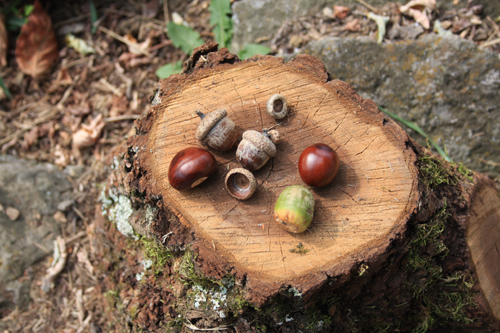
Feast for a squirrel.
*photo
credit)
November 2, 2019 Emphasizing Local Food-Growing, Less Purchasing
The conscientious consumer demands good food safeguards for what is purchased and consumed. Early in my public interest work came the discovery that good consumerism is good environmentalism. Food needs to be low-priced, nutritious and of local origin -- the three-legged stool of food balance. Consumers want their money's worth and that means high quality, chemical-free, properly weighted, well-labeled food materials. Focus on good nutrition is part of high-quality purchase/consumption, not the whole picture.
The environmentally-concerned involve themselves in food issues as well. These citizens prefer foods that are not shipped from great distances (shipping demands transport energy and refrigeration in order to keep the produce fresh). For them, local food sources become a prized consumer focus and do not demand food safety inspections because the origin can be easily checked. The environmentalist is more focused on resource conservation in the cultivating, processing and delivering of food. The activist consumer may demand serviceable individualized packaging for protection and verification in purchase as to quality control; the environmentalist may be interested in keeping the packaging the type that requires fewer resources in production (bring-your-own containers rather than plastic bags). Furthermore, one can select loose produce available by the touch.
Food purchasers have different concerns from those of food growers. The more astute food purchasing advocates turn attention to pressuring the Federal Trade Commission with demands for truth in advertising and in more comprehensive food safety requirements. "We become what we PURCHASE and eat." On the other hand, growers are concerned about production economics, physical exercise, weather, water sources, local individual controls, and spiritual enhancement through communion with soil and plant life. "We become what we GROW and eat." My move back to the hills of Appalachia from urban DC in 1977 was because the simple lifestyle techniques highlighted in 99 Ways to a Simple Lifestyle needed to be verified -- and gardening was part of the research process. Certainly rural folks need food safeguards and consumer protection for they are also subject to massive infusions of junk foods; but growing one's food in a poor area is far more challenging.
If you have time, space and energy, use them well and grow your own food. Virtually all of us are purchasers needing to exercise consumer caution, but we can also be growers. If too old, or ill, or young, or busy, then moderate the extent of growing through the help of others. If able, then be both a grower and a purchaser in ways that allow for growing herbs, salad greens, and root crops well into autumn; limit purchase to foods not easily grown. When buying, be discerning as to quality and price, and patronize local growers whenever possible.
Prayer: Lord, direct us to what we can do best for the world in which we live; allow us to grow abundantly and purchase wisely.
Shades of autumn.
(*photo
credit)
November 3, 2019 Invite Those Who Are Ostracized
Today Salvation has come to this house. (Luke 19:9)
Jesus brings salvation to our wounded world, and we are to be as overjoyed, as the little man Zacchaeus was, over the coming of the Lord to us. This beautiful Gospel story follows the rich journey of faith that we walk with many different characters we encounter each week in Luke's gospel narratives. Some of these people we like and some we don't, but who could dislike Zacchaeus? In fact, the core of the story is that a hostility exists in the crowd because tax collectors are regarded as traitors for working with the Roman oppressors. How can Jesus who knows so much go to Zacchaeus' house -- of all people?
Zacchaeus is disliked by the social biases of the crowd. He may be honest and law-abiding, but disliked, and worse yet, segregated. Maybe he is even somewhat embarrassed at first that anyone even noticed him up among the foliage of a sycamore tree. Jesus does notice, and invites himself to Zacchaeus' house. The unexpected event causes Zacchaeus to fumble and try to justify himself in front of a frowning and eyebrow-arching crowd. They seem to be saying, "How dare this man think he is so good!" Zacchaeus hastens to counter this opposition, but he finds that Jesus is true to his word. Jesus is to pay dearly for this relationship, for this tempts plotters to halt his ministry.
Bring salvation to others. This demands strikes us with force, for we live in a world of over-segregated communities. Yet on closer look we discover that eternal life is when all types will someday celebrate together. We have to bring the saving powers of the Lord to them here and now. "Catholic" means universal, and that means we are challenged and concerned about all, even those we do not always regard as united with us. We so often overlook the "little people," the ones who are easily ignored and forgotten. That situation applies to individuals within our communities, those who are poor and marginalized and all too often overlooked. Seeing them is a mission and a Christian mandate.
Coming to know others means we discover some and even many who have joy to share with us. In turn let's invite them to be partners with us. We lose the suspicion that separates us; instead, we are called to help make their place safe and secure enough to be inviting. By conquering disease, eradicating mosquitoes, providing potable water, furnishing a steady food supply, and giving new affordable housing, we help open their homes to a broader community -- our global collective homes. We must extend home to the entire planet, a place where all can live in harmony with each other. Then salvation will come to "this" house.
Prayer: Help us, Good Spirit, to discover those folks hidden in the crannies of our communities, and to encourage them to fulfill their potential -- and ours as well.

Fresh pawpaw pie.
(*photo
credit)
November 4, 2019 Weighing an Organic Gardening Direction
A mounting effort is being made today to grow, certify, classify and purchase "organic foods," a fast-growing segment of the total food economy. Organic foods are those free from commercially-synthesized pesticides and fertilizers as well as other medicinal, growth-enhancing, and commercially-available chemical substances. The buzz word is "natural," and so organic evolved beyond the subject matter of our organic chemistry field. In the world of chemists, "organic" means naturally-derived chemicals, but through human-induced synthesis has came to include all carbonaceous compounds synthesized from coal tar or petroleum into carbon-derived materials. My tradition as a synthetic organic chemist included being thrilled to make new products whether useful or not, and mine were not naturally-derived organic chemicals -- they came from the most part from fossil fuel derived chemicals. For food purists "organic" means non-synthesized and challenges synthetic organic chemists. This is often puzzling to folks.
Fertilizers termed "organic" are the most difficult for chemists to accept. All admit that overuse of concentrated synthetic fertilizers has contaminated water systems through runoff and caused unnatural growth patterns among crops. For the life of me, I have to favor some basic "synthetic" fertilizers even though their overuse is quite harmful. However, my own fertilizing materials include not only my kitchen compost, but also my diluted urine on occasion, and certain wood ashes and mature horse manure. However, although I do not buy commercial fertilizers that are anathema to some, neither do I condemn them. My choice is because I am cheap, not because I theoretically oppose these fertilizers.
Pesticides that are synthetic rightly alarm many gardeners. I recall hired hands on our tobacco farm who would get sick from applying a lead arsenate, "Paris Green," (an inorganic chemical) on hot, muggy summer days. On the farm we also applied potent pesticides to beans and potatoes; however, in the years since, I have refrained from such applications for the sake of the agent and others who would handle and consume treated plants. My great uncle, a professional gardener, told about a stray spray plane flying over his field and playfully shooting some of his material at the field workers -- and one got very sick. Powerful pesticides are no laughing matter. Not all pesticides wash off easily or disappear. I plant marigolds as a pest repellent and have used evening primrose to attract Japanese beetles which are highly selective in menus. Companion plants can repeal insect pests.
Use as few commercial chemicals as possible whether as medicine or in your home, garden, lawn or orchard. Absolutely "organic" is difficult to attain, retain, and sustain today because contaminating chemicals are persistent and becoming somewhat ubiquitous. If organic certification is bothersome, at least reduce the use of commercial chemicals and go increasingly natural.
Prayer: Lord, inspire us to move to natural garden products.
Grasses, dried in autumn.
(*photo credit)
November 5, 2019 Being Concerned about Food Nutrition
Can one overdose on "nutritional supplements?" I watched in horror as a friend took his daily massive handful of vitamins and nutritional compounds at his breakfast table. He obtained all this assortment of freebies from a health center where his wife works. Maybe each item is good in its own right, but what on earth does such a combination do to the human being when metabolized simultaneously? Isn't this a form of overdosing? Isn't a combination of too many good things possibly a bad thing?
A few people grow up in a household that sets ordinary food before them and they are grateful -- and eat it. Another portion of eaters are more picky; they dictate what they like, and their diets could involve too much meat, fat or sugar, or lack of basic essentials. Nutritional balance is harder for them to establish. Many people live totally healthy lives through balanced eating and never taking supplements and extra vitamins. In other cases, people lack certain basic ingredients and, upon proper diagnosis, their doctors prescribe particular supplements. Still in other cases friends prescribe. People differ in nutritional demands.
Conscientious people are willing to invest in what they term good foods (fruit, vegetables, nuts, whole grains, etc.) and omit what they call bad (excess salt, refined sugar and fat). However, they will eat strawberries that they know are loaded with Vitamin C, and yet forget they are loaded with pesticides to help them stay plump and fresh when being shipped from a foreign country in mid-winter. When we construct a three-legged stool of local food, economic food, and nutritious food, we must consider energy expenditures in air-shipping strawberries. If we neglect the other two components (namely price and local growing), nutrition concerns can get out of kilter. Choosing to consume nutritious foods, locally-grown in season, is healthy for us and Earth; choosing to pay high prices for imported out-of-season nutritious foods is not.
Let's always champion balanced nutrition. Generally a healthy diet goes along with healthy physical exercise, and this allows for more sugar, fat or salt when these can be burnt off and eliminated in the form of sweat. Thus balanced body exercise allows a greater variety than what nutritionally-concerned "foodies" permit in their kitchens. Let's honor the attempt to refrain from eating out-of-season food that is not grown in a local greenhouse or protected garden, or preserved as frozen, or canned, or dried, or pickled, or stored in a root cellar.
It is possible for some to become overly concerned about their personal health. We ought to uphold and honor balanced nutrition at all times, along with food economy and local food sources. We need to live simply and still not overly concerned in a selfish manner. Let's attempt to strive always for good nutritious food for our immediate and our entire global family.
Prayer: Lord, help us be food conscious in a balanced way.

Brightly colored red and gold against blue sky.
(*photo credit)
November 6, 2019 Resolving Issues While Partaking Meals
While residing in Washington, DC, I became personally acquainted with Esther Peterson (1906-1997), who was the Special Assistant for Consumer Affairs under the Johnson and Carter administrations, and later president of the National Consumers League. In that period, Esther was a vice president of Giant Foods and an advisor to our CSPI on food issues. I was always ambivalent about "consumerism," for it did not always include a balanced environmental component. In one meeting with Esther, I expressed my anti-nuclear energy concerns; she said she wanted to get me together with her pro-nuke acquaintances, and she was willing to invite us all to a good home-cooked spaghetti meal to hash this whole issue out. Now to me that was a Washington approach, mixing my-mother's-home-cooking-solves-problems philosophy with a major global issue. Yes, a home-cooked meal sounded great, but I told Esther that although while tempting, I doubted that it could resolve matters. Something far more fundamental was at stake.
We need not deny the power of partaking meals together. Jay Womik in The Great Upheaval: America and the Birth of the Modern World 1788-1800 writes about "the most famous dinner in American history (p. 163). On June 20, 1790, Thomas Jefferson, who knew how to entertain with good food and wine, invited James Madison and Alexander Hamilton to his house and they hammered out a compromise; this was to have the states' Revolutionary War debts assumed by the federal government; at the same it would placate Virginia by proposing that the Federal District be placed on the Potomac River between that state and Maryland. Simple compromise worked there but it does not always work. Where fundamentals are at stake, orchestrated meals may only define differences. Meals may resolve personal matters, but rarely do they have the same success as that one in 1790.
Ralph Nader told his raiders never to take even a cup of coffee from someone with whom we have fundamental differences. I regret that I took a cup of coffee from an oil company executive once and then refrained from bringing up a matter of the company's pollution problems. Washington, DC, is a charged place, one where all are in general agreement about the need for government, and so conviviality through food and drink is one way of coming to compromise. But are all potential compromises equal, especially when one side has far more political or economic power than another? Sharing food is necessary when people are hungry; it is not necessarily a specific time when differing issues deserve formal lengthy debate. Food can help resolve personal issues; that is not so in all political and economic problem areas where compromise means capitulation to the stronger side -- who pays for the meal. Don't devalue the effectiveness of a meal together, for in short-term issues differences can be defined or worked through; however, some demand public debate away from a dining atmosphere.
Prayer: Lord, help us be people who desire resolution to divided and partisan issues, but to know when they take time.

Fallen leaves of the sugar maple, Acer saccharum.
(*photo
credit)
November 7, 2019 Knowing Food Source Is Good Quality Control
If we choose locally-grown food, we have a better chance of knowing the source and deciding whether what is grown is good for us. Difficulties arise when we want our food to come from indeterminate places. Local farmers' markets allow the interaction of grower and consumer. However, while actual gardening is better than talking about plant growth and market conditions, sometimes purchasing is the best one can do; not everyone is able to be growers; the elderly or ill do not have the capability, nor do the very young, or the overly busy, who do not have sufficient time to do much more than snatch quick meals and hope for enough sleep.
Today, for those with energy and space we must consider "Freedom Gardens," that is, gardens free from corporate control of our eating materials. These are equivalent to the "victory gardens" of the Second World War that supplied a nation with ample nutritious and low-cost food, and freeing farmers to grow grains and oils for export. Freedom gardeners also gain benefits: physical, spiritual, social and economical. Remember that much urban land is now in lawn, which consumes about one-seventh of our energy-intensive fertilizer plus the fuel needed by motorized lawn-care instruments (it takes less non-renewable energy to cultivate gardens than to manicure lawns). The locally-grown produce requires no transport energy; neighbors may be encouraged to convert lawns to gardens; cultivated landscape can be beautiful.
Local gardens can be grown on once-prime farmland-turned-suburban-residence. Environmentalists talk about "farming on the edge" and mean encroachment of development on large tracts of farmland with expanding metropolitan areas through suburban sprawl. One can grow produce around houses or on roofs of buildings. New-found garden space is available and these areas extended seasonally through cold frames and greenhouses. With changes in attitudes about food, people come to prefer more locally-grown food while out-of-season foods appeal to the affluent, thanks to rapid air-shipping and refrigeration. However, non-seasonal carbon footprint is horrible, and pesticides go undetected, all for the sake of perfect appearance. Think about creating your own food source.
The marketplace remains a popular food source. Modern supermarket foods entice us, as we walk the long air-conditioned aisles filled with choices. We buy from our list, and then personal impulse adds this or that to the shopping basket. Yes, we are doing what is induced by container appearance: color, shape, logo, etc. Resolution to buy only needed items has been broken and the labels are passed over. Eventually some labels ARE read. When eating we may pick up and read the labeled container stating ingredients or calorie contents. The government has established requirements to check false and extravagant claims. And wise consumers agree; we need to know the purchases we make.
Prayer: Lord, make us more aware of what we eat and where the food comes from, so that we can better control our food sources.
Encouraging Domestic Change
Nothing on this earth is permanent and so we accept change as part of life. Thus it is better not to pretend that things will always remain the same; they won't. Far more realistic is to discover ways to cope with change and this includes individual and domestic changes. Radical renewal of our threatened Earth requires us to curb climate change, and this becomes a participative process involving all who use energy in their daily lives. Individual actions are critical because use of consumer items and services are two-thirds of our economy; reducing energy and resource demands at the individual level indicates that each of us can contribute to the radical change that is called for. Here are some ways:
Heating and cooling demands: Overheated houses in winter (above 60 degrees Fahrenheit) and overcooled in summer (below 70 degrees) make heavy demands on home heating and air-conditioning (AC). Do we even need air conditioning and to what degree? Are fans sufficient? If due to hot summers AC is necessary for residents, then conserve by carefully monitoring residential and business space and time.
Travel and vacation mode and frequency: The average auto user through careful planning can reduce number of trips. Can these be achieved through carpooling with others? If I can't afford a fuel efficient electric car, can I continue to practice safe driving and good maintenance (tires, oil change, etc.) with what I have? Purchasing items on the Internet saves trips but the item must be delivered to our door. Consider the use of public transportation where and when possible. Vacations could generally be closer to home and fewer long distance adventures; vacation energy expenditures depend on distance travelled, number of passengers in a vehicle, and type of aircraft used for travel. A single private jet trip can exceed annual energy of an entire African village. Think before traveling, “Is this trip necessary?”
Electronic devices and addictive behavior: The Internet demands energy to maintain its network functions; so do home and domestic computers, and rechargeable computer hand-held devices. Am I addicted to these devices? Do I leave electronic devices in operative mode even when not needed? Do I need the latest device?
Food habits: Some see radical action as going vegetarian or vegan; others of us prefer reducing meat consumption to social and festive occasions. Nevertheless, if considered on a massive scale of global food consumption, curbing meat use and other products of animals, which take a major portion of arable space to feed and maintain, is optimal. One way of sharing food resources is switching to recently developed plant proteins substitutes. Wall Street Journal laughs about methane-generating farting cows, but belittling global efforts at reduced meat consumption only shows basic insecurity. Use less non-seasonal foods and imported exotic foods to save transport costs. Do I grow some of my own food and/or patronize local food growers? Do I avoid many processed foods with heavy sugar, fat and salt content? Do I promote eating unprocessed organic foods? Will I substitute hamburgers with plant subs?
Resource use and recycling: Do I reduce the use of plastic bags by bringing my own cloth grocery sacks? Do I try to purchase bulk foods and use less individual containers? What about the use of less disposable paper towels, cups, plates and tissues? Individualized water bottles and drinks take enormous amounts of packaging material in comparison to use of tap water (perhaps using a purifying device). Do I refrain from using all forms of discardable materials as much as possible? If used, do I sort materials into paper, metals, types of plastics and cardboard?
Community conservation and cleanup: Locals should do the job of keeping the area clean. A joint recycling program with multiple sorting of products makes everyone rethink twice about who will clean up the mess. A multitude of small practices has a ripple effect, and community programs can have a multiplier and catalytic effect of bringing about changes faster. Recycling programs begin with the community but demand resource streams guaranteed by our government, which direct energy distribution (grid) networks, degree of advertizing and promotion of consumer products, efficiency of domestic appliances, public transport infrastructure and encouragement of small farms for growing food crops.
Tree care and planting hold a key to radical change. One does not consider planting trees as radical, but such individual actions are rooted in solid change. In the past few decades the cutting of tropical forests to make palm tree plantations in Malaysia and Indonesia has resulted in both injury to wildlife habitat and a slower removal rate of atmospheric carbon emissions. In fact, these emissions increase with wildfires that have increased frequency in the Western U.S. and Canada, in parts of Europe, and even in tropical parts of Africa and Latin America.
Voluntary measures are good but insufficient in themselves to bring about radical change. Willingness to be conservation-conscious is difficult to cultivate; it takes sticks as well as carrots. An emphasis must be placed on enhanced individual responsibility (an educational process) and on governmental assistance and cooperation at all levels. Radical change will not occur through a purely voluntary approach, for humans are who they are and many need pressure to undergo change, especially middle and older folks who like to follow their own lifestyles.
Effective results can occur when individual actions, both voluntary and enforced, work in tandem. Much depends on the conditions created by the crisis and the patriotic demands placed on all citizens and not heavily on a few. People do respond to crisis situations even if some resist. Wars can enlist a general populace when the life of a nation is at stake. Curbing climate change is more than traditional warfare; profiteering must cease and all invited to do their part in saving or wounded Earth. Through the grace of God we can succeed.

Autumn mums to brighten an autumn day.
(*photo credit)
November 8, 2019 Gardening Demands Patience by Everyone
In the 1980s, I began to take gardening seriously. This involved having my own personal garden, since it took me too much time supervising the inexperienced. Let's admit it, I did not have the patience to be a gardening teacher. Inexperienced novices can't tell a weed from a useful plant, how close to hoe without disturbing a root system, what to mulch, or the importance of not tramping in the growing area. Even the time of day is a matter of when to work in the garden. The general consensus that everyone can garden needs some distinctions: everyone should garden; and gardening has its fill of slow learners and impatient teachers. But we gardeners can learn patience and beginners can mature.
Gardening economics is a driving force behind growing your own produce. In fact, the other advantages of gardening such as physical exercise and resource conservation can help multiply the dollar-and-cents savings beyond mere calculations of savings per hour spent. Small plots will not be spacious enough to feed families who want to satisfy bulk needs such as grain or dairy products; however such plots can go a long way in supplementing a budget with some higher-priced specialty items that are highly nutritious, but beyond the ordinary shopping list. Where more land is available, the grower may opt for lower-priced crops such as sweet potatoes or cabbage. When the land is still more spacious, one can consider pumpkins, watermelons, sunflowers, and sweet corn.
The human touch is of utter importance; we must touch the soil in which we receive nutrition and life. We bless the land when we touch it and work with it to our benefit. Our over-indulging consumer culture suffers from a disease that some term "Affluenza." Just as destitution is undesirable, over-abundance at the other end of the consumption spectrum has its negative effects as well. A happy middle ground is the space in which material goods are not too scarce or too abundant. When speaking of garden produce, appropriate "use" means moderating the amount of intensive-resource foods and choosing less resource-intensive, simpler foods. Yes, food insecurity exists and millions go to bed hungry.
The United Nations estimates that an additional one hundred million people are in danger of lapsing into food destitution due to climate change. An additional billion people go to bed hungry and also lack decent affordable housing and safe drinking water. On the other end of the resource spectrum, a privileged few eat an over-abundance of resource-intensive food. Yes, lack of communal health and good drinking water are a major global concern in certain regions. Climate change will make matters worse in the years to come as warnings go out from the UN World Food Program. To furnish essential needs for all takes a willingness to share the food surpluses with those in need.
Prayer: Lord, teach us patience to pass on the wonderful skills of gardening to those willing to carry on in the future; help us see food needs from a global perspective.

Friends. (Green frog, Rana clamitans).
(*photo credit)
November 9, 2019 Becoming Local: We Are What We Eat
We look to our gardening to help make us who we are:
1. Spirituality: Natural growth processes generate rhythms of the soul. We are spiritually uplifted in growing our own food.
2. Resources: Energy savings result from raising home-grown produce in contrast to factory-farming and transporting food.
3. Personal Control: Gardening allows households to avoid contaminants on produce and to ensure the safety of their foods through organic processes.
4. Environment: Making a garden plot on our homestead is an invitation for all people to find growing space and help alleviate the growing shortage of cultivable space on this planet.
5. Labor Practices: Home growers have better control of labor practices at all stages of food production and preparation. Consider the exploitation of migrant farm workers, who are often expected to work without adequate protection against agricultural poisons and without proper housing conditions.
6. Aesthetics: Let's beautify the countryside. Construct the garden landscape artistically through the choice of plants, the timing of maturation and the careful placement of each vegetable.
7. Eco-justice: Make a powerful political statement of social justice/eco‑justice through gardening. We will not buy products unless we are sure that the farm workers receive a just wage.
8. Health: Obvious health benefits occur to all including older people who get outside exercise and fresh air when gardening. A sense of well-being and control over one's life comes when seeing the fruit of our labor.
9. Savings: Economic benefits result from growing one's own nutritious foods and sharing them with others in the vicinity. We know that food prices generally rise and local gardening is a way to ensure household economy.
10. Psychology: In growing our own food we can take control over our own lives and gain an added measure of self-respect. We provide for ourselves and break the total dependence on others for our food needs -- and this encourages us to become activists.
11. Model: We show others in the local area what they can do to become self-sustaining through gardening. People tend to imitate those who are neighbors; they discover that learning about gardening is less threatening if teachers are familiar to them.
Prayer: Lord, teach us grow some of what we eat, so that we become one community of those eager to feed a hungry world.

A once-productive henhouse.
(*photo credit)
November 10, 2019 Professing a Living God
God is not the God of the dead but of the living. (Luke 20:38)
How do we profess the living God to others? This is a question for every believing Christian. We cannot just plod along as though we were the same as a person completely enamored by the secular world around us. We need to do more than tweet or chat on Facebook or look around for the next scandal to feel better than some unfortunate soul. We must do something that shows our words are committed to actions. Are we so calloused as to neglect our suffering brothers and sisters, whether just down the street or thousands of miles away? Scripture tells us that we respond in actions that show that God lives in the creatures all around, and that our respect for them manifests our belief in their Creator.
We need to remind ourselves that basic insecurity on the part of others, whether it be hunger or lack of proper health facilities, is a form of terrorism. We certainly do not want to terrorize others, but as a responsible community we do just that if we fail to feed or give them proper health. Our nation is spending over one billion dollars a day fighting terrorism and attempting to keep the world secure through extended military bases in all parts of the world. Are such military efforts truly a good way to secure a higher quality of life for all the people? Or must there be more? We show in our actions that God is truly with us -- and we do this by ensuring life for all in the human family, for to be "for God" means being for our neighbor, both local and distant ones.
Some may say, "Let's be practical." We can only focus on so much security at one time, and some of the armed ones will be sacrificed in the process. Being practical in the most elementary sense is furnishing basics to those most in need -- and this has a higher priority than killing terrorists in the mountains of Afghanistan or allowing our military weapons to be used by so-called allies in their fight in Yemen. Terror comes in many forms, and we cannot look to eliminating one form while allowing others to exist. True security means feeding the hungry and giving proper health to those in need.
World hunger and lack of health facilities could be eliminated with only a fraction of the one-and-a-half trillion dollars spent each year on military forms of global security -- and more attention to fighting disease and hunger could be the greatest form of global security in itself. This must not be just a hopeful thought but a practical set of deeds that manifest our belief in a living God, one who lives among us and inspiring us to act in a godly manner. Let's consider furnishing food to a local food bank or giving to a national or global charitable organization such as "Bread for the World" or the "Sudan Relief Fund."
Prayer: Lord, help us to profess our belief through deeds such as working together with others to alleviate the urgent problems of a suffering and hungry world.
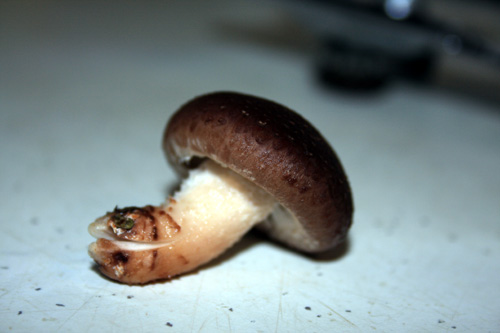
Home-grown shiitake mushroom, harvested after brisk autumn rain.
(*photo credit)
November 11, 2019 Choosing Simpler Nutritious Foods
Choice in foods is not easy for many poor folks due to limited markets with higher quality selections. The most ideal remedy is to grow one's own food to the degree possible. The tripod of good gardening is good fresh quality, nutritional content, and productive yields. The fresh quality refers to both the feel of the produce and the taste of that which comes directly from the garden. Through choice of specific cultivars within the vegetable groups (along with proper harvesting, preserving, and cooking), we can retain quality texture and tastes; through careful selection of crops, good nutritional content can be secured; and through raised beds, interplanting and other intensive techniques, the quality-minded gardener can obtain plentiful yields.
Current mass-produced vegetables involve picking hybridized unripe produce, shipping for long distances in refrigerated units, using artificial ripening agents, and selling in a supermarket chain. The nutritional value of such commercial produce is limited when it is harvested before ripening, for vitamins and other components do not have time to develop. Commercial producers desire products that are perfect in appearance, that is, free from blemishes, without regard to the presence of chemical pesticides or the loss of nutritional content. Chemical-free commercial produce is not always available is higher priced. A wormy apple may be unappetizing, but it may indicate the absence of pesticides. My finicky aunt accepted worms in produce, calling them signs of being chemically-free and, if accidentally cooked, a protein source.
Today, many combine higher quality food choices with lifestyle practices such as smaller vehicles, less spacious homes, less fashionable clothing, more time with family (down-sizing job expectations), and more time given to the arts and music. In a world of limited resources, we might emphasize obtaining bulk products (materials that are needed in large quantity) -- food, water, building materials and energy supplies -- from sources close at hand where quality is controlled and transportation costs reduced or eliminated.
Locally grown fruits, vegetables and herbs allow for a more balanced and wholesome diets able to reduce resource-intensive foods such as animal products and processed foods. Unit-for-unit, the meat-, milk- and egg-producing domestic animal is a consuming agent, requiring considerable feed to stay alive, reproduce, and furnish products for human consumption. Much grain is required for conversion to the final animal product that is ultimately consumed. Grain-fed beef is at the highest end of this intensity scale, with pork, middling, and poultry and fish at the lower end of the scale. Animal feed (corn, other grains, hay, soybean byproducts, and even pastures) takes up a considerable portion of our prime farmland.
Prayer: Lord, teach us to choose simpler foods that are locally produced through environmental methods and emphasize less resource use; help us to prefer seasonal foods as well.
Rain barrel to store and supply water for small garden plot.
(*photo credit)
November 12, 2019 Considering Small-Scale Gardening Techniques
Over the years gardeners develop a set cadre of techniques, which may be modifications on existing garden ideas. Mine include:
Raised beds allow for the excess water to drain off rapidly and permit me to cultivate soon after a rain. Some people require mechanical tillers to do some of the hard work in the spring. On the other hand, fashioning a labor-saving raised bed takes a lot of initial human physical labor, but regard it both as physical exercise and as an investment in the future of the garden. In fact, gardening is a moderate physical exercise using a variety of muscles; it is not repetitive like cycling or hiking. Moderate bending and working hands and back muscles are all part of growing vegetables, herbs and flowers, all of which can be intermixed.
Mulching is important for keeping down the weeds; once you are convinced, you will be happy to know that extensive literature exists on types of mulch (plastic, leaves, sawdust, straw, dry grass, etc.). I find that vegetative mulching with vine plants is really the best, provided the peppers and tomatoes are not smothered by the more aggressive varieties of cucumber or cantaloupe vines. Once we realize what the spatial needs of a certain vegetable are, we can consider room for expansion at a given plant location. We can place certain plants near paths or open lawn for future expansion; with greater care we can allow the plant (zucchini near certain herbs) to act as a vegetative cover for others. I plant peppers amid cucumbers because the vine cover protects the peppers that grow straight up and need little room.
Floral intermixing gives color to the area, and at the same time marigolds and other flowers serve to keep certain insects away. On the positive side, the presence of enticing flowers will act as an attractant for butterflies and for pollinating insects that are so crucial to all produce. I have lilies and various spring flowers in at the start of the active year, zinnias and black-eyed susans in summer, and marigolds and cosmos in autumn. Unfortunately, the deer like lily blossoms so we have to add hot sauce solution.
Various salad greens are needed, for the cost of fresh produce in most places mounts up, and the greens' nutritional value is immense. A goal ought to be to introduce a variety of salad species during the entire year, especially during the non-growing winter months. Greens have other benefits; for instance, mustard borders serve as barriers to discourage roving rabbits. Herb-growing in small areas or in a special herbal bed is worth considering, since fresh parsley or oregano are good for spicing soups or other dishes. Many herbs can thrive in winter in pots, and thus be moved indoors in colder weather. Many grow herbs near the kitchen for convenience.
Prayer: Lord, help us to be grateful for the energy it takes to garden well; inspire us to share techniques with others.

A late-migrating monarch.
(*photo credit)
November 13, 2019 Preserving Surplus Food and Never Wasting
They all ate as much as they wanted, and when the scraps remaining were collected they filled twelve baskets. (Luke 9:17)
Our outdoor growing year is coming to an end and we look back and reflect on what we had as surplus -- and what we did with it. Wasting produce is not in the bones of conservationists. This raises questions: did we eat all of what we grew or purchased? Did we share surplus with the needy or appreciative friends? Did we attempt to preserve what we could not consume?
Preserving surpluses has changed with time. A solid motivation for preserving was for a supply of food during non-growing periods. Other obvious benefits have included: convenient food for a variety of winter menus; good budget strategy and a hedge against food-price rises; emergency supplies at times of floods, violent storms, or earthquakes; showcase of good housekeeping because open shelving delights visitors; and teaching the need to never waste food. Our foresighted ancestors used various preserving techniques: drying, salting, canning, storing in root cellars, and leaving root crops in the ground through early winter. We imitate their foresightedness through the many ways we can preserve food today:
* Root Cellars are partly or totally submerged outer buildings or interior space. They are dark and cool places at constant temperature and controlled humidity, where produce can be preserved during winter. Root cellars are good for potatoes, virtually all the root crops, squash, pumpkins, brassicas, apples, pears, celery, and even individually-wrapped tomatoes.
* Canning fruits, berries and vegetables takes effort in the heat of summer, but preserved food tastes great in winter and the contents are beautiful to behold on storage shelves.
* Solar drying is a low-priced excellent preserving-technique for low-moisture produce such as carrots, onions and apples. In its own way, this technique has been around a long time also.
* Pickling involves the ancient use of common salt; curing meat through the salting process dates back to hams from Celtic lands transported to Roman overlords almost two millennia ago. The salting or "pickling" process extends to cabbage (sauerkraut), cucumbers, beets, peppers, and turnips as well as eggs.
* Freezing produce is a convenient food-preserving method, but generally uses non-renewable energy to operate. Some products become leather-like through freezing without special treatment, but the method works well for corn, peas, berries and many fruits.
Besides all these active ways simply allowing crops to winter in the soil is a simple preservation method in temperate areas. In Kentucky, we can protect and preserve carrots, Japanese radishes, Jerusalem artichokes, onions, and turnips even beyond late fall.
Prayer: Lord, teach us to see that wasting food is sinful; help us to spread the word without being too self-righteous.

Berries of the flowering dogwood, Cornus florida.
(*photo credit)
November 14, 2019 Creating Our Own Fast Foods
Fast foods may be quite popular but they have been around in various forms for some time. In fact, throughout time people who needed to travel had foods that did not take extensive preparation from dried meats to hard-boiled eggs. Some kept beef strips under their saddles or made use of dried fruit, or nuts, or "hardtack," or oatmeal or pickled foods. Eating on the run has a long history, though today we have more options. Yes, we have snacks, "trail mix" and "gorp" and all sorts of frozen or prepared foods that compete with hamburgers and fries in fast food places.
Busy folks satisfy their hunger pangs in different ways: eating seated in served traditional fashion; ordering in a vehicle at a fast food restaurant; preparing frozen dinners from the deep freeze; and heating meals in the microwave, etc. We need ideas, especially if we want to eat balanced meals, to refrain from prepared foods heavily laden with salt, refined sugar, and animal fat, and to be economic in time of belt-tightening. Possibilities exist:
Let spices work for the common meal -- Make enough of a dish for several meals and do not limit eating these to once a day; however, so the same food will vary in taste, change the herbs and spices with each new preparation.
Create simple meals and desserts -- Learning to prepare attractive dishes does not mean that they have to be exotic, for fresh fruits, herbs, and vegetables are attractive in their simplicity. A mixture of watermelon and blackberries when in season is good as a salad, lunch or dessert in the evening.
Select simple snacks -- These snacks can be of a wide variety and could involve fresh vegetables and fruit and nuts in contrast to potato chips and dip. Celery and carrot sticks, or apples, or orange slices can substitute for expensive prepared foods and reduce preparation time and clean up. Some people focus on popcorn or peanuts; others prefer whole-grain snacks such as oatmeal or roasted soybeans with dried fruit or nuts.
Consider multi-tasking the cooking process -- Steam vegetables within the pot of brown rice that is being cooked for about one hour. I use Swiss chard, zucchini, carrots, collards, poke leaves, mustard, kale, peppers, radish greens, apples, or beet greens.
Mix fresh produce with leftovers -- A batch of chopped up materials from the garden can enhance a day- or week-old soup or pasta dish. Enhancement can also be ingredients from canned or frozen materials. Varying produce allows new tastes and appearances, all needed for the spice of life.
Prayer: Lord, give us a good sense of spending time with others in the social atmosphere of eating together and the bonding that results. When time requires a faster meal, let that not be the routine but the exception; it still can be nutritious.
Governmental/Individual Cooperation
Governmental action is critically needed in the struggle to curb climate change, just as is participation by individual citizens as we demonstrated last week. The problem is one of collaboration and acting together at all levels of endeavor: community, regional, national, and global governments working in tandem with enthusiastic individual citizen actions. Neither government nor individuals can succeed without cooperative efforts on the part of all. When one level is not cooperative, as is the case currently of the national Administration, then the collaboration breaks down, even with good will on the part of many local and regional governments. When a major player like the U.S. government is not on board then the global efforts will lack an effectiveness necessary to curb climate change. Hopefully a more enlightened government at the national level will start to work in a bi-partisan manner to encourage this cooperative endeavor. Otherwise, it is truly a crime against humanity.
Governmental action at the community level is needed for a host of reasons: fairness in paying for necessary local services (public roads, license facilities, police and jails, and public schools) without which there could be no stable society. We freely accept the need for community services unless we are hermits or hardened homesteaders -- and even these need interactions with others at times in their lives. Local folks are not slaves or serfs but rather citizens participating in governance through voting and sharing mutual responsibilities. Resistance to change is often most challenging at the local community level because conservative forces have immense influence over the actions of neighbors who they personally know. Community organization is of critical importance as is preserving peace, protecting the vulnerable, and furnishing essential services. Radical change demands a willing local community.
Regional government can furnish the foundation for interactive public and private work towards change. The public needs progressive leaders and the private sector needs to see the value of sound investments in renewable energy sources, something that is now highly regarded by competitive market forces. Renewables are lower priced than fossil fuel (even natural gas) in both installment and ongoing operation; they certainly are surpassing highly expensive and insecure nuclear powerplants. The current private energy market invites solar and wind as well as geothermal and hydropower; with research and development the non-polluting hydrogen economy is soon to bloom as well.
National governmental action is key today in encouraging renewable energy research and development. One must object to the road blocks placed in implementing the 2015 Paris Climate Change Accord and hope they will soon be lifted through strong bi-partisan efforts. The current Administration’s continued support of fossil fuel is purely political and has no rational scientific or economic sense. Why choose costly pollution sources when non-polluting ones are less expensive and easier to install and maintain? National environmental R&D must be directed to energy efficiency and conservation measures as well as developing tidal, geothermal renewables and an upcoming hydrogen economy. Furthermore, an energy tax on fossil fuel use would benefit the transition to a renewable economy for it has direct bearing on polluters.
At the global level the amount of energy consumed in the next decade or so will be double current levels. This is why the community of nations must focus on renewables to the greatest degree possible; otherwise, the fossil fuel sources will still be widely tapped by developing nations to the detriment of all.
Renewable energy subsidies should be enhanced and not restricted as is soon to happen with solar energy issues. A rapid increase in solar renewable energy outlets is occurring with now 3% of total electricity generated by large or small scale solar units. This is expanding at over 60% this year after a plateau effect in 2018, with the lowest cost of solar installed units now occurring. Continuation of past benefits, some of which are now ending, must be expanded over the next decade so that solar, wind, hydro and geothermal will truly come into their own.
Taxing the wealthy is a necessity; undertaxed wealth postpones a renewable energy economy and is detrimental to democratic process. Our country was an early industrially polluting nation and contributed a heavy contamination load; now in fairness the U.S. must contribute its excess billions of wealth to implementing a Green New Deal and to cleaning up the environment, both here and abroad. Early environmental costs went uncalculated; however, the so-called "developed" nations are far more to blame for the damages that have accumulated through rising greenhouse emissions. Taxes on the wealthy are needed for the capital to bring about radical change. An energy tax on all users should be implemented, but this is highly unpopular.
Penalties for failure to redistribute wealth need special attention. Greed and wastefulness are not limited to the wealthy alone but permeate our society at all levels. Monetary fines such as $500 for littering has some effect when enforcement is possible, as is achieved by traffic cops stopping speeders. Granted, solitary places lack normal enforcement, though photo capture or citizen reporting could help apprehend culprits. Among fines could be some form of community service such as cleaning up litter and beautifying landscape; in service payment has the added effect of possible public embarrassment to the perpetrator.
Governmental agencies are needed to bring about radical change. Conservationist lifestyle practices can be accelerated rapidly by enforcement of fines. Urgency requires citizen good will gestures to confront normal resistance to change. Pray that this occurs.

Colors of the faded Eastern redbud, Cercis canadensis.
(*photo credit)
November 15, 2019 Controlling Enticing and Tempting Foods
Few things increase girth in middle age faster than to give up physical exercise or smoking. I modified the first and gave up the second. Elders cannot expect to remain in the same condition as in youth, but it was difficult for me after forty-three years of jogging to give up that beloved exercise. Burning off calories easily and the running "high" experienced in jogging are missed -- and rowing in place is no really good substitute. Moderation in exercise and smoking cessation calls for greater self-control. To gain such control often makes food smell, taste, and look better -- that final allurement for the weight-gain prone. In youth, when calories were being burned at a rapid rate, we thought we would stay thin forever. Not so. When under less stress upon aging the metabolism changes along with adding unexpected weight.
Moderation in all things is a good principle for those called to weight-watch for the first time. With good food much comes down to portions with appropriateness including size and frequency. Our thought is to satisfy the appetite, and our imaginations suddenly see good foods spring forth in many places; a thought occurs to go to the refrigerator one more time. Advertisements can allure us with sights of good dishes; restaurants can beckon; friends can invite us to meals. Celebrations occur with ample tables. Middle age spread is a reality when you love to eat good food, but all this is harder to change with advancing age. Yes, self-control!
Those of us who seek to be in solidarity with the poor realize that pastas, beans, and cornbread cost less than fresh fruits, yogurt and most nuts -- and yet these foods add weight. Diet changes seem to make Lent a year-round season, but it also brings self-control to the forefront. We muster new reasons for control. Less weight makes us more mobile as well as puts us on a better health track and we can stay younger in looks and spirit.
There are many ways of dieting and saying "no," but none come easily when one has an appetite for a wide variety of foods. Food issues emerge and stay in importance triggering our brains to call out for one more snack or second helping. It is amazing that when we forget the names of all but the closest of associates, we still can vividly recall the sights, smells, and tastes of our favorite foods. Acquaintances are forgotten, unless they are edible. Each food dish carries with it a concatenation of events and warm feelings that rush back into vivid memory.
For those of us with good appetites, food is always tempting except when we are really sick. The better thing to do is get one's mind off the food issue and concentrate on other desirable practices -- or to have a glass of water. Remove oneself from ready access to food; limit eating times; regulate snack food variety and availability; take smaller portions; refuse desserts or limit amounts; and eat more in morning and less in the evening.
Prayer: Lord, teach us self-control in a food scarce world.
Home-cultivated blackberries from wild bushes.
(*photo credit)
November 16, 2019 Sharing Food and the Last Judgment
For I was hungry and you gave me food. (Matthew 25:35)
Food enters into every aspect of our life. As we age, we confront the fact that all mortal life is terminal (not eternal life); no amount of food in quality or quantity will change that fact. Loved ones pass on, but we hesitate to say that they die. Some ill people linger, and some pass quickly, and some depart violently when least expecting it. The judgment seat looms just beyond the horizon for all, and yet is never in the mind of many. We listen and hear Jesus speaking to us and it is food-related. He is pressing us about feeding or neglecting to feed him when he was hungry -- as he identifies himself with the hungry. Do we extend our individual sharing with bountiful food to others in a local community? Do we seek to do this in a hungry world community?
Food issues can enter into our exercise of citizenship. Could surplus food that is wasted feed a hungry world? How do we allow and tolerate one thousand billionaires and one billion people without food security today? The verb "allow" is what bothers me most. How can some have the power to hold or to withhold resources, and some be so powerless? Why do I bother about proper food distribution in our world when I can do so little about it? How can I take on a citizen's responsibility and help make the food commons a reality? Will we citizens who have a certain responsibility to pressure our legislative representatives be held accountable for not doing so? Can we enter into a mother's experience of no food for the morrow, hunger's form of terrorism?
Christians regard Christ as King who will judge each of us on our own merits and demerits. The reality comes ever closer as we age; our time shortens inevitably with each passing day -- and judgment soon becomes just around the corner. We have our individual feelings about this most certain event; only the uncertainty is when -- not if. Are we brave enough to be stoic about what is coming? Better, are we wise enough to start preparing for the final days? Is our sense of civic responsibility growing with respect to human needs? Does our silence as citizens speak volumes -- and that deals with our upcoming accounting? Is it wrong to ask all these questions in a world devoid of answers?
Nothing focuses attention more than definite events in the near offing. As we continue on our journey of faith we hear the clock ticking away, but it could be an emerging promise, not a dreaded happening. We are people pressing forward to a definite future that can be one of untold happiness -- provided we prepare well at the present time. And preparation includes sharing our plenty with others who are in need.
Prayer: Lord, give us the courage to see where we are and how soon the place will change in our journey to you. Help us prepare through sharing with our neighbor in need. Lord?

White-lined sphinx moth (Hyles lineata).
(*photo credit)
November 17, 2019 Knowing the Signs of Our Times
...When will this happen, then, and what sign will there be that this is about to take place? (Luke 21:7)
In this year 2019, many people still are deniers of the climate change that is sweeping our planet. Can't they look out and experience hotter July and August; these seem to break a record each year. What about calving ice caps, more severe floods and droughts and rising oceans? Some fearful people choose to deny that climate change is of human causation, and prefer to regard this as an anomaly or quirk of nature. They prefer to listen to merchants of doubt who want to prolong the fossil fuel economy as much as possible for their profits. Today's Scripture readings have never been more pertinent than right now.
Security in the Lord involves a fear and also a trust. Our fears need to be well-founded with perceptive observation; furthermore, we can do something about what is happening. We are not fated to the inevitable; we can make our future through the power that God gives us in the Sacraments. The materialistically-concerned address insecurities by more insurance, anti-ballistic missiles, wallets of cash, credit cards, college degrees, locks, vehicles, full storage bins, alarm systems, and on and on. The more religiously inclined take their fears to the worshiping community who are also struggling to find answers to this fragile world around us; believers affirm personal sin and group wrongdoing in the same breath. Yes, we do sin and we make mistakes, and part of this is what we do collectively to our earthly environment.
If this planet's age were a single year, Christ would come in the last moments. He postpones his return out of mercy but it will be "soon." Let us prepare to meet him. He assures us our past was imperfect; our future can be better; our present must be our point of immediate focus. When havoc is pending and major changes occur, people may retreat into a state of denial. They seek desperately to grasp for some control on matters at hand or say that this is all the product of fake news. Or as we all hope, they join us on our knees begging God's help in critical times.
An authentic spirituality calls us to thank God for the opportunity to serve the Almighty here and now. We pray for the insight to see these times through keen observation and a serenity of spirit. All of this calls us to ask the right questions and listen for the response from authentic and honest sources. Materialists are distracted by glitzy things; they fixate on an idealized past that did not really exist -- and ye regard it as present. An authentic spirituality faces reality for what it is and begins the process of accepting responsibility by starting to make the world a safer place.
Prayer: Lord, help us know the signs of the times; alert us to profess this sense of urgency effectively to climate change deniers.

Lattice atop fresh wild berry pie.
(*photo credit)
November 18, 2019 Keeping the Food Distribution System Fair
The right to ample and nutritious food is essential to proclaim. Food riots have and will undoubtedly continue to occur in poorer countries. America is not in such dire circumstances at this time, but food shortages occur here as elsewhere. I serve an Appalachian county with a higher than average poverty rate with high drug use and overdosing. As one might expect, some of our residents run low on food, especially at the end of each month. Conventional food sources often run short of food supplies.
The American government's (federal, state and local) food sources are generally available. Our greatest source is food stamps, which those with low incomes can receive. The use of a personal coded card has reduced abuse of this program. One of the difficulties is that these stamps can be used for a wide variety of food and even soft drinks by people unfamiliar with cost and with little understanding of the lack of nutritional balances resulting from excessive junk food.
A specific government program is WIC (Women, Infants and Children), which provides food, health care referrals and nutrition education to low income pregnant, breast-feeding and post-partum women as well as infants and children up to age five who are in nutritional need. Another favorite distribution program provides food surpluses through the federal commodities program that dispenses peanut butter, cheese, and other nutritious commodities to those who qualify; this program is very popular here.
Non-profit organizations have sought to fill in the cracks. Direct money handouts have been discouraged and are not now a popular means due to misuse by those who suffer from substance abuse. A better direct approach is the retail card that is sold by various food supermarkets; these can be used by the recipient with only slight restrictions depending on buyers' choices (and include gasoline at associated fuel stations). Cards can be misused.
Garden produce and other food surpluses such as wildlife from hunts are available at various times of the year. Sharing these with people who are in immediate need or who can preserve the surplus in some fashion is ideal for reducing hunger. Unfortunately, this is quite seasonal and does not necessarily mean that the surplus reaches those in greatest need. Second Harvest programs are available in some places; these groups identify outlets for slightly outdated and unsold perishable foods and collect and distribute these materials to the homeless and lower income people. Again, the program depends on hit-and-miss conditions. Meals-on-wheels distributes prepared dinners to the sick and elderly. Churches and other institutions give food baskets at Thanksgiving and Christmas. Our parish has a food pantry that finds use on numerous occasions of need.
Prayer: Lord, keep us sensitive to the needs of the people and to defend the existence of food distribution programs.

Oval ladies-tresses, Spiranthes ovalis.
(*photo credit)
November 19, 2019 Distributing Food Commodities Properly
Hungry people need food, and commodities ought to be easily available for them. When need arises, charity is required, but we often ask ourselves what are the long-term effects on recipients of free food? Local food distribution problems affect two different sorts of people: those who are reluctant to get the food even when they need it out of personal respect and pride; and those who are takers when they could earn their daily bread through other means. The first group often have worked hard in life and through illness and old age are now strapped for food. The second are those who can clutter the distribution system and give it a bad name.
The first, once they have been persuaded to take from the food commons, will use the handout wisely and not waste the materials given, nor choose junk food when offered options. Just getting them into the food distribution network is sometimes a chore, but when they have authentic needs such is well worth the effort. This group is usually most happy to use the basic staples: flour, cornmeal, cooking oil, canned or dried milk, and beans or equivalents; they prefer to prepare good meals from simple foods.
The second class of citizens are more difficult to address. The lazy or the ill-budgeted parts of that category of cases find it hard to meet needs properly for themselves or their families. These folks may be harmed by easy handouts and can become mere professional beggars; they crowd out those who are more in need of food. Some will go so far as to trade food items, food cash donations or unspecified food cards for drugs. Sometimes the food- card soft drinks are sold and money used for drugs; generally food distributors are experienced and alerted to these folks but feel helpless in changing these practices.
A certain freedom to purchase within a food stamp program is allowed; this was practiced early in the food stamp program when Coca Cola and other soft drink producers were strong proponents, even though some of us spoke out against using food stamps for soft drinks. The softer-hearted championed the needy's right to choice; harder hearts regarded the taxpayers' right to see that food money was spent wisely. In many ways, this makes those who really need the food be placed in a doubly difficult situation.
Food education exists for WIC (Women, Infants and Children) and should be extended and even be mandatory for food stamp recipients, when a specifically restrictive food distribution policy is not enforced. Such education should include making one's own baked goods, herbal drinks, fixing bean and other non-meat protein materials using a variety of spices and flavorings, preparing healthy snack foods, use of more fruits and vegetables, and choices of meatless meals. The needy can be fast learners.
Prayer: Lord, give us an understanding of distributing food properly as well as eliminating the hunger condition -- and to ensure that recipients learn to select and use their food wisely.

Livestock, grazing in pasture.
(*photo credit)
November 20, 2019 Emerging Vegetarianism
My attitude on vegetarianism has changed since first writing about this issue a decade ago; and it is more than just me. A strong movement is emerging, especially among the young in developed nations, to move away from the current global push to eat more meat. We are aware that in China and developing nations hundreds of millions are entering a middle class demanding greater diversity in diets, that is, more diets of resource intensive meat.
An environmental outlook, on the other hand, calls for less meat consumption because plants as food has a much smaller environmental imprint than does meat from animals. Differences depending on type of meat and plant are astounding. If all arable lands now used for animal feed were turned into legumes, grain and vegetable production for direct human consumption there would be no shortage of land for a growing world population.
Animal abuses such as chicken-raising factories and cattle feedlots add an emotional cast to the vegetarian argument. In recent years the swing has been to this industrial meat production on a major scale both in the United States and other food-producing and exporting countries. Vegetarian arguments gain strength, even when not convincing all. The emotional regard for animals when combined with the effects of excessive methane production by large numbers of cattle (19% of total) and other polluting factors only add weight to this expanding environmental outlook.
A moderate vegetarianism means refraining from daily meat consumption; only eat meat on festive occasions like a majority of the world's poor people. Granted some small primitive cultures, especially in frigid regions of the Arctic, do not have vegetables in their diet, and so meat is an essential component of the total diet. Some call for only eating meat from grass-fed cattle and omitting industrial meat production and feed lots. Other groups have had to supplement their diets by eating wildlife such as deer, rabbit, turkey and wild goose. In all cases, the need to respect what is killed and reduce total meat consumption go together.
Moderation is more convincing than strict vegetarianism, to which some opt and thrive. However, the practical move to get people to shift diets to more plant products is good green practice. The "Impossible Burger" has a key ingredient of soy leghemoglobin with an ingredient that satisfies meat lovers' cravings. Many new plant additions that imitation both texture and taste of meat products are now becoming available at low prices. Good environment and economics can be joined. A good rule is: eat animal products when health or other necessities dictate; otherwise reduce meat consumption or completely abstain when well-being, environmental consciousness, and animal respect dictate.
Prayer: Lord, we know Jesus ate Passover lamb and fish at his gathering. However, let us see the need to move towards a vegetarianism that permits all people to share limited resources.

November leaves on deciduous trees remain green only for a short time in
Kentucky.
(*photo credit)
November 21, 2019 Calculating Total Food Energy
We can talk about the energy content of food in two ways: the internal energy or the amount of calories that can be obtained by digesting certain foods; and the amount of external energy it takes to grow, process, transport, preserve and prepare the food. With reference to the first, we could focus on "empty calories" to be avoided by those of us with weight problems; we could also focus on the needed, rich-calorie foods needed by famished workers or trail hikers who need extra energy due to heavy exercise.
With reference to external energy factors, we search about and find non-renewable energy inputs in many often hidden places. We may want to stop or to continue searching for energy factors such as advertising and promotion, or land fertilization or preparation for crop-growing. We tend to neglect these more hidden factors, depending on whether we want to prove more or less energy use:
energy in crop growth and tillage and harvesting;
energy to transport produce to processing centers;
energy in agricultural waste disposal;
energy in processing and storing raw materials;
energy in manufacturing food containers;
energy in transporting foods from place to place;
energy in commercial storage, refrigeration, and lighting
of processed foods;
energy in discarded out-of-date foods;
energy in traveling to and from the market to the point of
consumption;
energy to refrigerate and store purchased food;
energy required to prepare food for the meal; and
energy to wash utensils and dishes used at the meal.
Let's take two cases; in one we want to air-ship raw grapes from South America to our regional food distributing center; these are transported by refrigerated truck to the grocery and there they are refrigerated and a certain percentage sold and not tossed. We go by automobile and purchase the raw grapes, take them home, and decide to eat them as a nutritious dessert or for snacks. Thus, we note that this unprocessed food has a considerable external food energy content. In contrast, we eat only seasonally-grown local grapes that occur in August up to and into early autumn. We go out, pick, and eat them right there. Virtually no external energy is needed and yet the same nutrition may exist (provided neither example is treated with pesticides).
Attributing external energy is a complex task. Have we included the governmental security factors in bringing foods into this country or costs of safety procedures? However, granting the limits in accounting, there is value in comparing different methods for obtaining our food. Transparency includes energy expenditures that others would prefer to overlook. The exercise assists us in raising our levels of food/energy/environmental consciousness.
Prayer: Lord, make us aware of and respect our food bounty.
Invitation to Radical Spiritual Change
The old order changeth, yielding place to new,
and God fulfills himself in many ways,
lest one good custom should corrupt the world.
"The Passing of Arthur" by Alfred, Lord Tennyson
We can speak about the need for radical change and yet realize that we are imperfect citizens and flawed governmental agencies. It's difficult to demand others to change when we must do so ourselves. This means we will have to be willing to collaborate in ways that are not old-fashioned Capitalistic greed or Communistic tyranny; we need to be willing to work together for the good of all, not some greedy egotism or unrealistic idealism. The radical new system must be attentive to the needs of all, socially democratic in structure, and able to be monitored so corruption does not slip in unexpectedly. This can be done; this must be done in order to save the world from catastrophe.
Those of us more comfortable with radical change need to be open to seeking divine guidance for something so risky as failure to change, which stares us in the face. Christians realize that Mary the mother of Jesus in her song of praise says the lowly will rise and those in high places come down. Such words are both spiritual and revolutionary, for only divine guidance and assistance can see us through to such a noble goal of equality for all. The revolutionary part is that such an enterprise is not done by the wealthy through some sort of “Prosperity Christianity," where the wealthy lead as champions. Rather it's the poor who must bring this forward and will take on what is rightfully theirs (ours). Prosperous wealth is not the key to change, for it only replaces one wealthy with another; the little folks be damned. A new system must furnish the needs of all people, not add to the surplus of those in power. A world of superrich and destitute is not stable; one of selfless service is promising but has degrees.
A first degree of humble service: The desire to know justice and to extend this knowledge to all people of good will is essential. This refutes a basic denial of current conditions of vast disparity of wealth and power. To know the poor is the first step to salvation, but only the first step, and not totally sufficient in itself to bring about change -- mainly it's because knowledge does not automatically produce action. The knowledgeable may opt to distance themselves from the difficult struggle.
A second degree of service is to enter into solidarity with the people who suffer. The serving person wants to help, but on his or her own terms. However, this is still largely theoretical and allows the one who enters to find time to escape into the world of allurements, because the task is so difficult.
A third degree of service is to identify with the lowly (we and not they). This calls for action that is so risky that it leads to becoming marginalized by a world resisting change. Only when we risk distancing ourselves from people at the first and second levels are we able to find ourselves close to Jesus; we too can work with others who strive to be selfless. Thus our ecumenism must be primarily with the poor throughout the world. It is the Scriptural underpinnings of this third degree that moves us to act.
Fidelity versus success is a priority. In a success-oriented world, faithfulness holds little sway. Only the number of gains are what counts in profit-motivated society. This has its terrible limitation, for it loses the true focus of a longer-term goal that may stretch beyond one's mortal lifetime. A radically new system cannot be established through small incremental changes that are quantitatively measured and turns all progressive growth into short-term success stories. To be faithful is to see that radical change will ultimately bring good results, but not in the way that a material society looks upon progress. Fidelity is thanking God that we have lived and continue working so long, not that we can measure success in our service but that we can be of service. Our faithfulness involves trust, and spiritual fidelity is to place trust in God -- and let God be the judge of our success.
Our goal is radical faithfulness. To save our Earth is not a measureable increment but an ongoing process. To say we have succeeded is to halt and rest on laurels, but that is quite deceiving. We can only advance if we see that success is far into the future, when a New Heaven and New Earth will be initiated in God's good time. That period is beyond us as to estimates and is not ours to predict when or where; we are to faithfully continue to work towards that horizon in which we believe, but do not see fully. "We are unprofitable servants; we have done what we were obliged to do." (Luke 17:10). We have power to act, not to judge.
Can and will we succeed? The dual question does challenge our faithfulness, for answers are not automatic in a short-term. Yes, with God's grace we have the power to save our wounded Earth; will we do so within the next few decades depends on our willingness to act in a collaborative manner with the community of nations. There's no short-term assurances that we will do so. Ultimately the Kingdom of God will endure, but what is the length of time and what are all the conflicts and struggles leading up to it? The fact that we could severely damage our Earth through tolerating continued greed and waste stares us in the face. Success is beyond the horizon, but how far away is that?
The conflict is between good and evil, though the secular view will deny this. Reality calls for an intensive spiritual view; it's not who will win but how soon will we effectively move to curbing climate change. Let us pray that evil can be overcome and that the forces of good can predominate. It is our hope that we can help make this occur by avoiding catastrophe and create a system that leads to the betterment of our beloved people and planet.

Billowy clouds overhead.
(*photo credit)
November 22, 2019 Designating Food as a Powerful Weapon
It was Joseph, as the man in authority in the country, who sold the grain to all comers. (Genesis 42:6)
Perhaps those in authority such as parents and guardians know that withholding desired food from someone has a way of changing behavior. "No ice cream tonight unless ...“ and then the demands to which the underling is expected to conform are made. Often food has been used as a weapon or enticement in order to change conduct. Down through history this was not just a story involving those who are unruly toddlers or youth; unfortunately, the power of withholding food from adult populations could have the effect of bending servant practice or feudal subjects; recall the biblical story of Joseph and his distant undersupplied family. Some extend this practice to pets in a similar fashion. Conformed practice of jumping hoops is closely related to food distribution and rewards.
Using food as a teaching tool or weapon is quite unjust when it comes to the needy, for it can verge on cruelty and abuse. Placards carried by beggars at signal lights occasionally disturb us with, "Will work for food." We know that during the Great Depression this was a practice for those with empty stomachs -- the willingness to work for full meals. Hungry people can be quickly reduced to dramatic requests for a meal. But they need a living wage that consists of more than a day's food. What these begging experiences tell us is that distributing food can be a strong means of getting one's way. Right to sufficient food takes precedence over retaining surplus as a means to exercise power over others.
In a world of scarcity, food means power. Such a weapon of giving or withholding food is cruel; it makes people subservient and reduces them to groveling, which destroys their human dignity. Such differences threaten and disturb the social order. A world of the super-rich lording over the destitute can exercise this power of withholding food. However, all parties -- the hungry and the withholder of food -- are hurt when one is overlord of supply.
Certainly, the poor and hungry are quite aware when praying the Our Father seeking "our daily bread." Here the well-fed may latch onto other interpretations of that prayer that do not deal with the "our" being the entire family of human beings. The well-fed often distance themselves from the hungry, but by coming closer to our neighbor the prayer takes on new meaning. Some sated with food bounty have no concept of this physical hunger and thus distance themselves from needs in an insensitivity that condemns them. The poor must recall to the well-fed, that everyone’s salvation depends on the ability to share in the food commons.
Prayer: Lord, inspire us to work for social justice and teach us to see that our bounty is meant to be shared with those who are needy at this time. Show us who these are and how we are able to assist them in some fashion.

Remnants of the Kirkwood Pike covered bridge spanning the Salt River, Mercer
Co., KY.
(*photo credit)
November 23, 2019 Reducing Fat and Sugar Intake
Consider the foods that cause the weight gain, those sugary and fatty ones that go to the gut, our storage room of added energy. Some of us have stopped the practice of daily weighing and even scrapped the scales. Easily available sugary and fatty foods are part of the obesity problem in this nation. The percentage of people weighing more than the obesity mark (depending on personal size and body density) has risen in recent years from 15% to 20%, and now to 25% of the total population in a number of states including Kentucky. In a land of excessive enticing sugar and fat we are made aware that obesity is a reality that strikes us in the face. In over half the American states, obesity rates have increased. Causes are generally attributed to too much of the wrong food and too little exercise. Several factors exist: lower smoking rates; more sitting during the day; less walking and more driving; larger helpings, especially sizes of restaurant servings.
Those of us who fit into the obese categories just mentioned ought to be doubly alerted. Get the problem kids to become active again and forego the computer games. Regard weight control as a total family problem, not just an individual's. Our circuits are wired to like the smell of fast food, the mouth-watering ads, the tastes of salt, fat, and sugar, and the prices that beckon people to come and consume more and more. The result of being caught by excess food includes obesity, diabetes and heart disease, and these are not nice issues to deal with.
David Kessler, former head of the Food and Drug Administration, has spoken extensively of this barrage of food enticements that affect us all, especially the role of advertising and the fast food places and large portions. We may want our money's worth and thus we eat more at buffets. What was said about companies inducing youth and others to smoke could be repeated with respect to food; however, we have to eat and whether we eat is not a free choice to start -- only how much we put on the plate. If we eat wholesome foods (fresh veggies and fruits), we are less inclined to health problems. However, many like other things also.
The food companies' strategy consists of increasing the processing of foods we choose to eat. Their battle plan is to get people to direct their appetites to the fat, sugar, and salt-laced materials that induce the desire to buy more and more of the same candy and Big Macs and salted snacks. Instead of water as a filler, the object is to promote soft drinks -- that carbonated sugar water with flavorings that costs much even at bargain rates. The promotion by food companies is partly to blame, not totally. We have to attend to their ads and then we cave in -- "the serpent made me do it." Personal responsibility is at the heart of weight-control, but that is not easily accepted at any age, young or old. We need some fats so let's prefer olive oil -- and no sugar drinks.
Prayer: Lord, my repeated prayer is one of growth in self-control and to help others do the same. Help me weight watch.

American beech, Fagus grandifolia.
(*photo credit)
November 24, 2019 Choosing a Throne or a Cross
At this end of the Church Year, we reaffirm our dedication to Christ the King, the one who is crowned on a "royal" throne. However, on closer inspection we see that this throne is actually an instrument of torture -- a cross for crucifixion. Christ is Lord of lords, and yet he has redefined royalty through servanthood, which involves taking risks and even suffering and death. His royal line from David is not through kingly succession alone, but in humble serving others.
Royalty takes a new form. Pilate, a frightened Roman bureaucrat, who thinks he must appease the mobs, questions Jesus about his royal line. Jesus speaks of being a king, but not in the sense that Pilate understands, rather of a throne which ends on the cross of ignominy. While Hope Cook became a queen of Bhutan and Grace Kelly a Princess of Monaco, still only a tiny number of the world's people can ever be or become royalty. Such chances fade for, while in 1900, 90% of the world's people lived under monarchies now, in the twenty-first century, less than 10% do so -- and the percentage is falling. Royal thrones are few, but crosses, in this age of troubles and threats, multiply. We can't be royal monarchs but we can enter into the service of sacrifice for others and thus share kingship with Christ.
In 1897 Queen Victoria of England (queen from 1837 to 1901 and empress of India 1876-1901) celebrated her diamond anniversary. On that occasion Rudyard Kipling wrote a poem that angered many, who thought the Empire's lasting glory should be unquestioned...
The tumult and the shouting dies,
The captains and the kings depart,
Still stands thine ancient sacrifice,
An humble and a contrite heart.
Lord God of hosts be with us yet,
Lest we forget, lest we forget.
Those few who ascend royal earthly thrones see them as fragile. Where is the Empress of India? Over a billion Indians would laugh at that idea today. Yes, twice that number of Christians are asked to glory in Christ's cross. Power is hidden when storm clouds hang low, lightning flashes and Earth trembles; yet it takes faith to perceive Jesus' power where crowds cast dice and squabbled over his simple garments. Cross is an instrument of suffering -- and more.
Cross is a kingly throne. We are being delivered into the kingdom of his beloved Son -- the image of the invisible God, the firstborn of all creation.... in him all things hold together (Col. 1: 12-20). The contrast of earthly majestic throne and rugged cross is astounding, and yet it is part of the unfolding mystery, which we are asked to contemplate on this Sunday. The entire creation is held together through the cross, not by earthly power. Will we each choose a cross and make it our throne?
Prayer: Lord, help us see what the cross means in our lives.
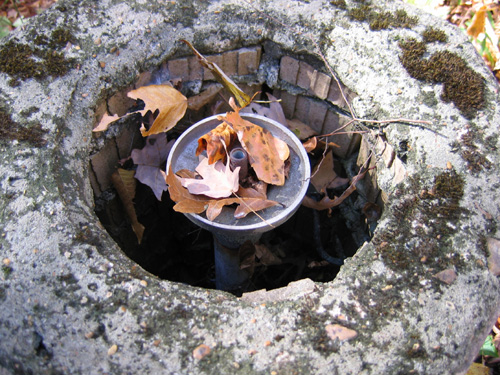
Autumn leaves collect in broken well along the Natchez Trace.
(*photo credit)
November 25, 2019 Seeing Food as a Gift to Share
...shall be like the hungry man who dreams he eats,
and wakes up with an empty belly. (Isaiah 29:8)
We need to see that people are the world's great treasure, and any time people suffer, we, as part of the human family, suffer as well. We may be tempted to focus attention on the healthy who are enjoying their days and making a sleek appearance in the world around us. We may want to turn away from the hungry for it is hard to gaze on the gray-faced ill or, for that matter, on pictures of extended bellies and gaunt expressions of hungry children somewhere in the world. However, authentic spirituality demands that we become aware of the true condition of our extended human family, not just blood kinfolks. Reality is hard to ponder.
Like the apostle Paul, we see the road ahead to glory and that sets us on a right track that can overcome our depression and make us hopeful. God is willing to renew us as promised of old and in offering us the power of the Holy Spirit. We have a course laid out for us, a treasure that we find and focus on diligently in order to secure fully the ends towards which we were created. That treasure includes the millions of hungry souls who are in need of essentials of life to which they are entitled, and yet climate change could make matters worse in the decades to come. We must be willing to act for the good of all through single-mindedness in reaching practical goals. Do we seek the face of Christ from each magnificent creature and especially from the hungry? Let's do something:
* Resolve to see the bitter effects on the poor through climate change conditions;
* Know and become involved in local hunger issues such as food kitchens or meals on wheels;
* Read and gather information on global hunger and make this part of our prayer life;
* Pressure elected officials to expand food assistance through letter writing, petitions, direct lobbying and civic action;
* Reduce meat consumption and use of prepared foods to only occasional rather than routine meals;
* Donate to world food causes and organizations that combat global hunger;
* Support rice bowl efforts and "Bread for the World;"
* Challenge personal or institutional food waste policies and ensure that leftovers can be distributed to the poor;
* Make food shortages a Twitter, YouTube, Email or Facebook issue;
* Resolve to expand the garden or the growing season so as to produce more local food;
* Give away garden surpluses; and
* Encourage friends and neighbors to do the same.
Prayer: Lord, teach us to share with others the great gift of food that we are fortunate to have access.

Fresh mulberry from summertime.
(*photo credit)
November 26, 2019 Supporting a Global Food-Sharing Program
...To share your food with the hungry. (Isaiah 58:7)
During Thanksgiving Week we look beyond our local communities to a hungry world. The hungry would call Thanksgiving leftovers a feast. However, table leftovers in themselves can hardly be shared because of spoilage in shipment. If bulk foods such as grain, root crops, and oil were not "prepared," but shipped for storage at key places, these could be trans-shipped to points of need when people suffer from floods, hurricanes or droughts. Sharing globally is a moral issue, and wasting food is an immoral one. Climate change threats to many affected regions are so to make this a very compelling issue. Economists suggest that food markets must adjust because of growing volatility of food prices and vulnerability of those who can't afford high food prices (food riots have occurred in 30 countries in the past decade).
First, agricultural protectionism by wealthier countries should be reduced. Second, food trade must have some insurance against export bans (a great stumbling block of the World Trade Organization); trade wars have contributed to food price spikes in times of droughts or famines. Lastly, the world would greatly benefit from a Global Emergency Food Storage System. John Maynard Keynes suggested this seven decades ago, and it is still a long way off. Maybe the World Food Program could run seaport depots in vulnerable areas: the horn of Africa, West Africa, South Central Asia, Southeast Asia, and the Caribbean, for starters. Storage systems could be protected from rodents and restocked after the life expectancy of food has expired; all distributing must involve sensitivity so as not to disturb local food systems. Bulk grains processed as noodles or other pasta have longer shelf life.
Reduction of wastes can occur on either end of the food production/consumption chain: growing, processing, transporting, and selling are one part; buying, cooking, reusing leftovers, and preserving are at the other end. Harvesting could be open to gleaners. At the consumption end, grocery stores often throw out outdated animal products and baked goods; and these could be sold at reduced rates or given to food distribution centers. Oversized restaurant portions often go uneaten. Furthermore, buffet operations result in large amounts of waste by consumers who take far more than they can eat. Some concerned folks may over-scold for wasting, and others neglect to challenge the practice.
Failure to share national resources leads to a steady undercurrent of discontent. The rich are targeted and even hated by some who regard them as influencing one's culture through materialistic movies, fashions and means of communication. When unemployed and with little future, low-income youth regard terrorism as an option. A feeling of insecurity pervades people who see no way out of their condition. Both socially and economically we are confronted -- and are drawn to share.
Prayer: Lord, make us more aware to share our food bounty.

A loyal friend.
(*photo credit)
November 27, 2019 Celebrating Food as a Bounty
Waving grain fields, overflowing storage bins, endless supermarket shelves stuffed with thousands of different food items. The picture seems soothing but it is incomplete. In the distance is the irritating whimper of hungry infants or the silence of those who are near death, or empty bins and drought-stricken fields. This age of contrasts is as near as a computer switch and as far away as a mind bent on escaping through a variety of distractions.
Bounty is a good picture; the lack of bounty is stark. When we prepare a Thanksgiving celebration tomorrow we ought to see how bountiful food triggers an attitude of profound gratitude. In fact, as we mature we think back at taking things for granted and forgetting to say thanks for things received after parental sacrifice and hard work. Those who look back with a sense of achievement and happiness always fill their hearts with gratitude, the last service they render before a happy death.
Thanksgiving Day should be every day, and this ought to be a national policy -- not a once-a-year observance. At this time we give thanks for the many gifts given to our land: its resources, its beauty, its spaciousness, its creative people, etc. In fact, our thanksgiving list ought to continue to grow over time. Our Thanksgiving holiday is not just a weekend or a Thursday each November, but rather it is an ongoing celebration brightening the way we live our lives. We learn from thankful people in their last years that they have much to "pray for" in their last great ministry, but these are beyond prayers of petition and begging and include thanksgiving -- for, if we end life with a thanks on our lips, a merciful God will surely overlook our imperfections and accept us into eternal life.
The food crisis has multiple causes: climate change triggered droughts and floods; enhanced demand for more resource intensive food by China, India, and emerging middle class countries; higher fuel and fertilizer costs discouraging farmers from food production; conversion of grain-growing cropland to parking lots, roads, businesses and recreational areas; and conversion of corn and sugar to biofuels. What can we do? Our soggy bowl of breakfast cereal cannot be shipped to another land or hardly next door. But can we take some constructive steps to alleviate food shortages? Must the answer be a detour from our celebration?
Thank God today by answering in creative or novel manner: serve in a soup kitchen on Thanksgiving; donate food surplus to the local food bank; assist those who are caregivers; report cases of food needs; say prayers before -- and possibly at least quietly -- after each meal or snack; share food surpluses; thank the cook(s); show courtesy and tip those who serve in restaurants; make our legislators aware of the need for food assistance and storage for drought victims; and consider an expanded edible landscape.
Prayer: Lord, inspire us to celebrate even in troubled times.

Autumn field against vivid blue sky.
(*photo credit)
November 28, 2019 Thanking God for All Good Gifts
Each day, week, month and year we ought to give special thanks. Of course, Thanksgiving Day is our grand "thank you" time for --
Being aware of others in need;
Creating ways of helping them;
Actually doing something for them today;
Thanking God for being inspired to focus on human needs;
Joining with others in a community gathering;
Urging others to serve where and when they can;
Taking in a meal with moderation;
Finding ways of preserving surplus food;
Refraining from indulging in commercial purchases; and
Resolving to continue to be thankful throughout the year.
Part of the American Thanksgiving story is recalling that the Indians assisted the first English settlers at Plymouth in Massachusetts Bay; there was a welcoming event though history has air brushed the manner in which the newcomers treated the hosts. Though this beginning feast may be partly a myth, still the history of settlement of this land has involved Native American food-growing experience being generously passed on to newcomers. These natives showed generosity to their neighbor because that was their culture of hospitality.
On Thanksgiving Day, our gatherings at the table take on a special meaning. For through eating food we are reminded of the community of people struggling and surviving by the largess of others. We thank God for seeing that sharing is a blessing for us and others. The resulting meal is really America's special cultural feast, namely, turkey, corn pudding, cranberry sauce, and pumpkin pie -- all foods from the North American continent. Other side dishes and other meats may blend with that tradition within the various cultural settings with emphasis on traditional ways.
Turkey is a key to this day, and it challenges vegetarian practice to abstain on Thanksgiving Day. Substitutes seem to pale and turkey may be an argument for being occasional meat-eaters and not total abstainers. However, that will be a decision on the part of practitioners that one should not tinker with during this season of thankful bounty. Today, our part of the county has an overabundance of "wild" turkeys. Amazingly, this stocking of game by hunting agencies has a side effect, for the "wild" turkey is heavily crossed with domestic varieties, and thus the offspring is a heavier and more enticing game animal than the original wild turkey. Furthermore, these modern wild turkeys are like tractors clawing their way across the fragile, woodland understory. In fact, ginseng seed and other plants as well are threatened by the manner in which they are devoured and crushed by these efficient fowl. Harvesting for Thanksgiving meals is a way to control this problem.
Prayer: Thank you, Lord, for this day and its gifts of joy.
Gratitude as Basis for Fidelity
Once a year in the Thanksgiving Day season we show gratitude for the many blessings that we have as individuals, as members of our local community, as Americans, and as global citizens. When we spend some time reflecting on our many gifts, we realize how much we take for granted that could easily be withdrawn or accidentally damaged in an instant. We are not deserving of these gifts, for they come to us through a loving and merciful God.
Let's learn always to be thankful. Gratitude is based on knowing that what we receive in life is pure gift. We are too often in a world of vocal and often harsh demand from unexpected sources: "I don't deserve this hardship;" "I will sue for this injustice done to me;" "Why has God done this to me?" In response to this harshness let us recall our humble condition. Do I forget to say thanks everyday for being alive? Do I sometimes forget to include an added "thank you" even when not needed? Do I regret being so thoughtless and distracted?
Let's help our neighborhood grow in gratitude. Having thanks on the tip of our tongue takes time to develop, but in so doing we can extend happiness to others. In saying thanks we help others cultivate a thankful attitude in a culture of gross materialism and the false belief that gifts are solely of human origin. At this season of gift-giving, some affluent givers (or recipients) act as though they expect and deserve gifts as part of a cultural ritual. Should we remind them to say thanks? Much can be gained by asking recipients, "Did you forget something?" "What?" asks the startled one; a favorite response is "Oh, I'm hard of hearing, and I didn't hear you say thanks." The failure to say thanks can become a moment of pain for the giver; in fact, if we fail to confront ingratitude, we are furthering the cause of crass materialism.
Let thanks advance social justice. Establishing justice is a responsibility on our part and is more than dispensing charity; it is redistributing what rightfully belongs to those in need. One wonders then should the recipient say thanks for what is received to fill hunger or thirst? The grace of following the moral responsibility to share with others is itself a gift from God, and so both the sharer and the one receiving should be moved to a joint response of thanks -- but that is hardly expected in our culture. Justice advances when we thank God for inspiring us to be agents of change; it is enhanced when those rising from poverty recognize the act of justice that is being advanced.
Let's have thanks on our lips. Better, let the habit of gratitude be so deep that we say "thanks" as part of our normal conversation; with cultivation it comes naturally. Let's remember to express gratitude to clerks and waiters and ticket agents and postal personnel and in all ordinary day-by-day commercial transactions. In this more than a seasonal spirit let's start to acquire a habit of gratitude. At times when others do a kind deed we may mutter "thanks" for them to hear, but it is not necessarily heard by others. Much depends on how the Spirit directs us, for maybe the neighbors could benefit by hearing us say thanks.
Let thanks be our departing thought. I have found, when attending to a dying person surrounded by loved ones, that a meaningful prayer is one of gratitude: it is comforting to list important gifts and events in the dying person's life; then we all say together, "Thank you, Lord." A few may find this difficult, for they rarely say an unsolicited thanks. At such precious moments the learning curve of care and compassion is high and the deep appreciation of the dying person inspires all to ease the journey to God. This act of gratitude reaches to the ears of the dying, for hearing is the last sense to go. Furthermore, how could a merciful Lord not hear that final prayer and all things considered not give a divine embrace to the departing soul?
Let's broaden the perspective. Believers recall that in a spirit of gratitude we realize that we human beings are created in the image of God; in that grand perspective we are endowed with the freedom of choice and strive to champion that gift, even when it is not perfectly utilized. At such moments of gratitude our past failures haunt us; however, now God's forgiveness emerges out of pure love. It is this divine love, in creating this universe and holding it in existence, which overwhelms us; divine love is willing to take us back when we have become ungrateful through misdeeds and have failed to say thanks. The perspective now is a blessed presence in which we realize the greatness of creation and the even greater greatness of re-creation. Thus our opportunity to affirm our works done prayerfuly gives greater glory to God.
Let's expand the limits of our gratitude. Perhaps a Thanksgiving holiday is a perfect time to review the mighty list of reasons and good things for which to be thankful (see A Ministry of Gratitude: One Thousand Things to Be Thankful for, on the special essays section of this website). That listing is by no means complete and invites your own thoughtful expansion. Perhaps the magnitude of the listing dazzles us, and yet it is the emerging of our consciousness of being "gifted" -- though some may dispute the use of that word; we are filled with gifts, but seldom overt to it.
Let's make gratitude habitual and help create a year-round atmosphere of thankfulness; let gratitude be the air we breathe. Thanks should always be on our lips: for continued use of senses; for many deeds done by another for us; when a neighbor calls to us for help; at those moments of reflection and prayerful expression when spontaneous experiences of nature's beauty are registered; after waking and becoming aware that we lived through another night; and at the end of day for things achieved during our waking hours. Let's never forget a "thank you" -- even now on this Thanksgiving weekend.

A Kentucky autumn scene.
(*photo credit)
November 29, 2019 Expanding Food Consciousness
Although my food habits may differ from yours due to taste, culture, economic status or even location, still we do have similarities worth comparing. As infants we took food for granted. Our tastes changed when abandoning baby food for the tasty stuff, and choices broadened. As we reached adulthood, we discovered that food attitudes involve sharing with others. We learned to celebrate with food. As our civic responsibility grew, our food attitudes took on a political flavor involving governmental regulation of safety and commercial practices. Some of us decide to control food sources through gardening and harvesting and new buying practices. As we moved past middle age, we needed less food and soon become more watchful of both quality and quantity. Lastly, in elder years we prepare to meet our Maker and think seriously about how our sharing with others, or the lack thereof, will be judged in some way.
Climate changing conditions make us examine our conscience about the way we consider food:
* Personal food choices give us a better understanding of the type and quality of food consumed. Our food choices should include greater emphasis on fresh fruits and vegetables, and de-emphasis on processed food, sweetened carbonated drinks, processed meats, refined sugar, animal fats, and salted snacks. We do this for personal weight control and for improved food safety, and also because of growing environmental concerns; this leads us to eat less resource-intensive animal products. Also we seek to eat seasonally to conserve energy needed for transportation.
* Foreign food aid is an issue. An authentic message is to transform the focus of aid, from shipping food packages to helping small farmers meet local needs. Fair distribution of food means not handing out more and more CARE packages, but a systematic advance in the food-growing potential of every region of the world. However, to upgrade eroded and depleted lands to full productivity requires resources such as farm training, better seeds, fertility testing, and proper fertilizer, and better farming tools -- a new Marshall Plan.
* Better use of food-producing land is emerging as a global issue. Why is 40% of our corn being used as a biofuel source for those with luxury vehicles? Prices of staple corn and sugar cane food products rise. This leads to some having sufficient food supplies, but others starting to cut back on the amounts they can acquire to feed hungry families. The first decade of the twenty-first century has seen increases, not expected decreases, in the absolute numbers in poverty and hunger (about one hundred million additional people in these unfortunate conditions).
As our consciousness about food grows we ought to see that these issues must involve legislators, especially at the national level, with adequate farm legislation to aid the needy.
Prayer: Lord, help us to become more aware of the hungry whether in our midst locally or throughout the troubled world.

Fond memories of a recent Thanksgiving meal.
(*photo credit)
November 30, 2019 Adjusting to the Age of Climate Change
Globalization has led to readjusting how we handle the ordinary things of life. Inequality among people has increased; those at the top of the ladder hope to continue the status quo with a fossil fuel economy that is being extended far too long. Look at the effects of climate change in our midst: extreme weather events, rising oceans, melting ice sheets, and hotter summers. Capitalists may be convinced that their system has triumphed, but this may be the end of that economic system without a new one in sight. See How will Capitalism End? by Wolfgang Streeck
An additional problem is the rise of hundreds of millions of Chinese, Indians and others from poverty to a middle class society, with growing demands for more resource intensive foods (prepared foods, increased meat and animal products and imported out-of-local season produce). In fact, according to the International Energy Agency, China has become first in energy consumption five years ahead of schedule. Grain-growing areas even in China are being converted to more profitable specialty crops. Furthermore, corn and other grains, sugars, and cooking oils are being converted into biofuels, which adds to the growing shortage of foods. We know that the weather does not always cooperate, and droughts help reduce total food production occasionally, increasing the vulnerability of those suffering from food insecurity.
Climate change certainly complexifies the picture. With possible erratic weather associated with global warming, some areas in Africa and Asia and elsewhere could become drier or wetter. Already the deserts have been extending in northern China by a million acres a year, although hopefully this can be stopped through reforestation and protective grass cover. Global warming could cause African desertification in such poor countries as Niger, Chad and Mali. Our American southeast may become drier also. When possible droughts hit the major food-producing regions such as the American or Canadian Midwest, Australia or Argentina, food shortages will be exacerbated. What is ahead? Such nations as the Maldives, Fiji, and several other ocean nations are alarmed about water level rise. Likewise change in river volume that supply water for India and Bangladesh could affect crop yields.
A challenge, right? In times of shortages, drought results in a ripple effect with richer food importers taking in more of the scarce commodities and poorer folks being squeezed. On a positive note, we have good meat substitutes made from soybeans and other crops that take much less land than that needed for pastures and feed grain production. In the past century we have experienced the Green Revolution, mechanized farm practices, corporate farming and pesticides, and new types of genetic seeds, synthetic fertilizers, UN food programs, storage facilities, giant cargo ships, and instant communications.
Prayer: Lord, make us sensitive to the needs of the poor, who will suffer most with the effects of climate change.
Gratitude as Basis for Fidelity
Once a year in the Thanksgiving Day season we show gratitude for the many blessings that we have as individuals, as members of our local community, as Americans, and as global citizens. When we spend some time reflecting on our many gifts, we realize how much we take for granted that could easily be withdrawn or accidentally damaged in an instant. We are not deserving of these gifts, for they come to us through a loving and merciful God.
Let's learn always to be thankful. Gratitude is based on knowing that what we receive in life is pure gift. We are too often in a world of vocal and often harsh demand from unexpected sources: "I don't deserve this hardship;" "I will sue for this injustice done to me;" "Why has God done this to me?" In response to this harshness let us recall our humble condition. Do I forget to say thanks everyday for being alive? Do I sometimes forget to include an added "thank you" even when not needed? Do I regret being so thoughtless and distracted?
Let's help our neighborhood grow in gratitude. Having thanks on the tip of our tongue takes time to develop, but in so doing we can extend happiness to others. In saying thanks we help others cultivate a thankful attitude in a culture of gross materialism and the false belief that gifts are solely of human origin. At this season of gift-giving, some affluent givers (or recipients) act as though they expect and deserve gifts as part of a cultural ritual. Should we remind them to say thanks? Much can be gained by asking recipients, "Did you forget something?" "What?" asks the startled one; a favorite response is "Oh, I'm hard of hearing, and I didn't hear you say thanks." The failure to say thanks can become a moment of pain for the giver; in fact, if we fail to confront ingratitude, we are furthering the cause of crass materialism.
Let thanks advance social justice. Establishing justice is a responsibility on our part and is more than dispensing charity; it is redistributing what rightfully belongs to those in need. One wonders then should the recipient say thanks for what is received to fill hunger or thirst? The grace of following the moral responsibility to share with others is itself a gift from God, and so both the sharer and the one receiving should be moved to a joint response of thanks -- but that is hardly expected in our culture. Justice advances when we thank God for inspiring us to be agents of change; it is enhanced when those rising from poverty recognize the act of justice that is being advanced.
Let's have thanks on our lips. Better, let the habit of gratitude be so deep that we say "thanks" as part of our normal conversation; with cultivation it comes naturally. Let's remember to express gratitude to clerks and waiters and ticket agents and postal personnel and in all ordinary day-by-day commercial transactions. In this more than a seasonal spirit let's start to acquire a habit of gratitude. At times when others do a kind deed we may mutter "thanks" for them to hear, but it is not necessarily heard by others. Much depends on how the Spirit directs us, for maybe the neighbors could benefit by hearing us say thanks.
Let thanks be our departing thought. I have found, when attending to a dying person surrounded by loved ones, that a meaningful prayer is one of gratitude: it is comforting to list important gifts and events in the dying person's life; then we all say together, "Thank you, Lord." A few may find this difficult, for they rarely say an unsolicited thanks. At such precious moments the learning curve of care and compassion is high and the deep appreciation of the dying person inspires all to ease the journey to God. This act of gratitude reaches to the ears of the dying, for hearing is the last sense to go. Furthermore, how could a merciful Lord not hear that final prayer and all things considered not give a divine embrace to the departing soul?
Let's broaden the perspective. Believers recall that in a spirit of gratitude we realize that we human beings are created in the image of God; in that grand perspective we are endowed with the freedom of choice and strive to champion that gift, even when it is not perfectly utilized. At such moments of gratitude our past failures haunt us; however, now God's forgiveness emerges out of pure love. It is this divine love, in creating this universe and holding it in existence, which overwhelms us; divine love is willing to take us back when we have become ungrateful through misdeeds and have failed to say thanks. The perspective now is a blessed presence in which we realize the greatness of creation and the even greater greatness of re-creation. Thus our opportunity to affirm our works done prayerfuly gives greater glory to God.
Let's expand the limits of our gratitude. Perhaps a Thanksgiving holiday is a perfect time to review the mighty list of reasons and good things for which to be thankful (see A Ministry of Gratitude: One Thousand Things to Be Thankful for, on the special essays section of this website). That listing is by no means complete and invites your own thoughtful expansion. Perhaps the magnitude of the listing dazzles us, and yet it is the emerging of our consciousness of being "gifted" -- though some may dispute the use of that word; we are filled with gifts, but seldom overt to it.
Let's make gratitude habitual and help create a year-round atmosphere of thankfulness; let gratitude be the air we breathe. Thanks should always be on our lips: for continued use of senses; for many deeds done by another for us; when a neighbor calls to us for help; at those moments of reflection and prayerful expression when spontaneous experiences of nature's beauty are registered; after waking and becoming aware that we lived through another night; and at the end of day for things achieved during our waking hours. Let's never forget a "thank you" -- even now on this Thanksgiving weekend.

Fond memories of a recent Thanksgiving meal.
(*photo credit)
November 29, 2019 Expanding Food Consciousness
Although my food habits may differ from yours due to taste, culture, economic status or even location, still we do have similarities worth comparing. As infants we took food for granted. Our tastes changed when abandoning baby food for the tasty stuff, and choices broadened. As we reached adulthood, we discovered that food attitudes involve sharing with others. We learned to celebrate with food. As our civic responsibility grew, our food attitudes took on a political flavor involving governmental regulation of safety and commercial practices. Some of us decide to control food sources through gardening and harvesting and new buying practices. As we moved past middle age, we needed less food and soon become more watchful of both quality and quantity. Lastly, in elder years we prepare to meet our Maker and think seriously about how our sharing with others, or the lack thereof, will be judged in some way.
Climate changing conditions make us examine our conscience about the way we consider food:
* Personal food choices give us a better understanding of the type and quality of food consumed. Our food choices should include greater emphasis on fresh fruits and vegetables, and de-emphasis on processed food, sweetened carbonated drinks, processed meats, refined sugar, animal fats, and salted snacks. We do this for personal weight control and for improved food safety, and also because of growing environmental concerns; this leads us to eat less resource-intensive animal products. Also we seek to eat seasonally to conserve energy needed for transportation.
* Foreign food aid is an issue. An authentic message is to transform the focus of aid, from shipping food packages to helping small farmers meet local needs. Fair distribution of food means not handing out more and more CARE packages, but a systematic advance in the food-growing potential of every region of the world. However, to upgrade eroded and depleted lands to full productivity requires resources such as farm training, better seeds, fertility testing, and proper fertilizer, and better farming tools -- a new Marshall Plan.
* Better use of food-producing land is emerging as a global issue. Why is 40% of our corn being used as a biofuel source for those with luxury vehicles? Prices of staple corn and sugar cane food products rise. This leads to some having sufficient food supplies, but others starting to cut back on the amounts they can acquire to feed hungry families. The first decade of the twenty-first century has seen increases, not expected decreases, in the absolute numbers in poverty and hunger (about one hundred million additional people in these unfortunate conditions).
As our consciousness about food grows we ought to see that these issues must involve legislators, especially at the national level, with adequate farm legislation to aid the needy.
Prayer: Lord, help us to become more aware of the hungry whether in our midst locally or throughout the troubled world.

A Kentucky autumn scene.
(*photo credit)
November 30, 2019 Adjusting to the Age of Climate Change
Globalization has led to readjusting how we handle the ordinary things of life. Inequality among people has increased; those at the top of the ladder hope to continue the status quo with a fossil fuel economy that is being extended far too long. Look at the effects of climate change in our midst: extreme weather events, rising oceans, melting ice sheets, and hotter summers. Capitalists may be convinced that their system has triumphed, but this may be the end of that economic system without a new one in sight. See How will Capitalism End? by Wolfgang Streeck
An additional problem is the rise of hundreds of millions of Chinese, Indians and others from poverty to a middle class society, with growing demands for more resource intensive foods (prepared foods, increased meat and animal products and imported out-of-local season produce). In fact, according to the International Energy Agency, China has become first in energy consumption five years ahead of schedule. Grain-growing areas even in China are being converted to more profitable specialty crops. Furthermore, corn and other grains, sugars, and cooking oils are being converted into biofuels, which adds to the growing shortage of foods. We know that the weather does not always cooperate, and droughts help reduce total food production occasionally, increasing the vulnerability of those suffering from food insecurity.
Climate change certainly complexifies the picture. With possible erratic weather associated with global warming, some areas in Africa and Asia and elsewhere could become drier or wetter. Already the deserts have been extending in northern China by a million acres a year, although hopefully this can be stopped through reforestation and protective grass cover. Global warming could cause African desertification in such poor countries as Niger, Chad and Mali. Our American southeast may become drier also. When possible droughts hit the major food-producing regions such as the American or Canadian Midwest, Australia or Argentina, food shortages will be exacerbated. What is ahead? Such nations as the Maldives, Fiji, and several other ocean nations are alarmed about water level rise. Likewise change in river volume that supply water for India and Bangladesh could affect crop yields.
A challenge, right? In times of shortages, drought results in a ripple effect with richer food importers taking in more of the scarce commodities and poorer folks being squeezed. On a positive note, we have good meat substitutes made from soybeans and other crops that take much less land than that needed for pastures and feed grain production. In the past century we have experienced the Green Revolution, mechanized farm practices, corporate farming and pesticides, and new types of genetic seeds, synthetic fertilizers, UN food programs, storage facilities, giant cargo ships, and instant communications.
Prayer: Lord, make us sensitive to the needs of the poor, who will suffer most with the effects of climate change.
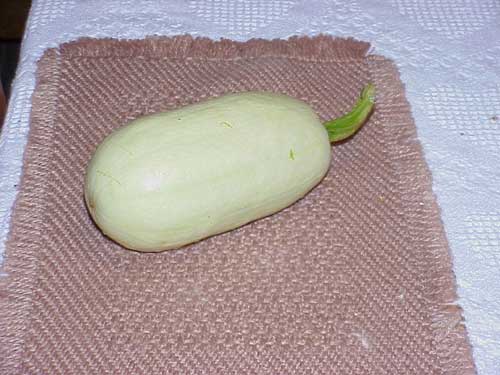
Volunteer squash from summer gardem.
(*photo by Sally Ramsdell)
November 29, 2019 Expanding Food Consciousness
Although my food habits may differ from yours due to taste, culture, economic status or even location, still we do have similarities worth comparing. As infants we took food for granted. Our tastes changed when abandoning baby food for the tasty stuff, and choices broadened. As we reached adulthood, we discovered that food attitudes involve sharing with others. We learned to celebrate with food. As our civic responsibility grew, our food attitudes took on a political flavor involving governmental regulation of safety and commercial practices. Some of us decide to control food sources through gardening and harvesting and new buying practices. As we moved past middle age, we needed less food and soon become more watchful of both quality and quantity. Lastly, in elder years we prepare to meet our Maker and think seriously about how our sharing with others, or the lack thereof, will be judged in some way.
Climate changing conditions make us examine our conscience about the way we consider food:
* Personal food choices give us a better understanding of the type and quality of food consumed. Our food choices should include greater emphasis on fresh fruits and vegetables, and de-emphasis on processed food, sweetened carbonated drinks, processed meats, refined sugar, animal fats, and salted snacks. We do this for personal weight control and for improved food safety, and also because of growing environmental concerns; this leads us to eat less resource-intensive animal products. Also we seek to eat seasonally to conserve energy needed for transportation.
* Foreign food aid is an issue. An authentic message is to transform the focus of aid, from shipping food packages to helping small farmers meet local needs. Fair distribution of food means not handing out more and more CARE packages, but a systematic advance in the food-growing potential of every region of the world. However, to upgrade eroded and depleted lands to full productivity requires resources such as farm training, better seeds, fertility testing, and proper fertilizer, and better farming tools -- a new Marshall Plan.
* Better use of food-producing land is emerging as a global issue. Why is 40% of our corn being used as a biofuel source for those with luxury vehicles? Prices of staple corn and sugar cane food products rise. This leads to some having sufficient food supplies, but others starting to cut back on the amounts they can acquire to feed hungry families. The first decade of the twenty-first century has seen increases, not expected decreases, in the absolute numbers in poverty and hunger (about one hundred million additional people in these unfortunate conditions).
As our consciousness about food grows we ought to see that these issues must involve legislators, especially at the national level, with adequate farm legislation to aid the needy.
Prayer: Lord, help us to become more aware of the hungry whether in our midst locally or throughout the troubled world.

Wild turkey, crossing a Kentucky rural road.
(*photo credit)
November 30, 2019 Adjusting to the Age of Climate Change
Globalization has led to readjusting how we handle the ordinary things of life. Inequality among people has increased; those at the top of the ladder hope to continue the status quo with a fossil fuel economy that is being extended far too long. Look at the effects of climate change in our midst: extreme weather events, rising oceans, melting ice sheets, and hotter summers. Capitalists may be convinced that their system has triumphed, but this may be the end of that economic system without a new one in sight. See How will Capitalism End? by Wolfgang Streeck
An additional problem is the rise of hundreds of millions of Chinese, Indians and others from poverty to a middle class society, with growing demands for more resource intensive foods (prepared foods, increased meat and animal products and imported out-of-local season produce). In fact, according to the International Energy Agency, China has become first in energy consumption five years ahead of schedule. Grain-growing areas even in China are being converted to more profitable specialty crops. Furthermore, corn and other grains, sugars, and cooking oils are being converted into biofuels, which adds to the growing shortage of foods. We know that the weather does not always cooperate, and droughts help reduce total food production occasionally, increasing the vulnerability of those suffering from food insecurity.
Climate change certainly complexifies the picture. With possible erratic weather associated with global warming, some areas in Africa and Asia and elsewhere could become drier or wetter. Already the deserts have been extending in northern China by a million acres a year, although hopefully this can be stopped through reforestation and protective grass cover. Global warming could cause African desertification in such poor countries as Niger, Chad and Mali. Our American southeast may become drier also. When possible droughts hit the major food-producing regions such as the American or Canadian Midwest, Australia or Argentina, food shortages will be exacerbated. What is ahead? Such nations as the Maldives, Fiji, and several other ocean nations are alarmed about water level rise. Likewise change in river volume that supply water for India and Bangladesh could affect crop yields.
A challenge, right? In times of shortages, drought results in a ripple effect with richer food importers taking in more of the scarce commodities and poorer folks being squeezed. On a positive note, we have good meat substitutes made from soybeans and other crops that take much less land than that needed for pastures and feed grain production. In the past century we have experienced the Green Revolution, mechanized farm practices, corporate farming and pesticides, and new types of genetic seeds, synthetic fertilizers, UN food programs, storage facilities, giant cargo ships, and instant communications.
Prayer: Lord, make us sensitive to the needs of the poor, who will suffer most with the effects of climate change. |